#there is also that whole men vs women moment in falls in love which would be hilarious with toffle like ???? I can't pick a side
Text


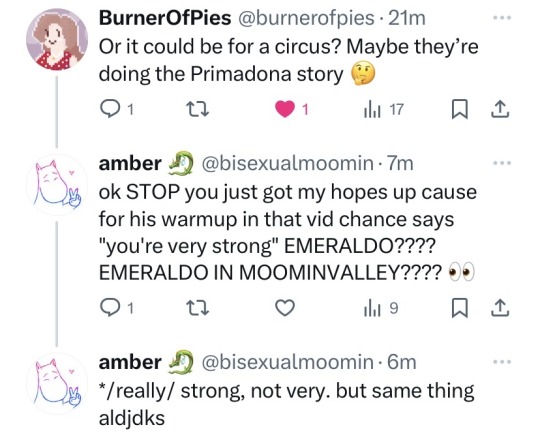
first pic is just from a post of mine from 2019 when we were theorising about season 2 - moomin falls in love came up then and I was a bit obsessed with thinking about how they could adapt it in this new series.
and now, theorising for season 4, la goona has once again been brought up... and I realised that in his video, when he was getting into the snork voice, chance said "here's snork, and you're really strong" who's strong??? how about a literal strongman, emeraldo!!!!! everyone's favourite egg-shaped guy!!
ofc, this could all be completely wrong, but it's fun to theorise!
#moominvalley season 4#moominvalley speculation#now would it still follow the moomin falls in love story? already including snork + misabel + this possible trick is something entirely new#(su ref lol) but would they still do the whole moomin-la goona-snorkmaiden-emeraldo love square? will SNUFKIN be involved?! ough#there is also that whole men vs women moment in falls in love which would be hilarious with toffle like ???? I can't pick a side#they could also just go with lars' moomin and the circus strip instead
22 notes
·
View notes
Note
I don’t think the harassment is acceptable. I think people are really out of pocket doing that, but I do think him establishing what is and isn’t part of his job is fine. And maybe did need to be said, because clearly people didn’t know.
As for using Buddie as promo… idk. The marketing team is gonna do whatever ABC feels will garner the most viewers, and right now it’s Buck being bi and the long held desire to see him and Eddie become canon. They’re gonna milk it however they can, which falls back on Tim, thus him feelings like he needed to explain himself, presumably.
I do agree it could be toned down though, because Buck is now canonically dating someone else, and I don’t recall them teasing Buddie for real when he was with women. So doing it now the way they are is purely because they’re banking on Buddie fans, while also currently not committing.
Plus, everything Buddie related from before has to now be assumed not canon, so it’s putting everyone in a messy spot. Because we have canon, fanon, show runner confirmed but not on screen, and canon jokes that are now floating in the in between because no one knows if the they’ll be acknowledged in canon or get scrapped.
I think people should just calm down and wait to see what the season brings, anyway. Once it’s over and we get an idea of where all the characters are at, then start asking bigger questions or letting out the more angry frustrations.
Hi! Sorry for the late reply. The sheer amount of work that goes into television hasn't often been well realized in fan spaces. The writing, how it translates to screen, the process of acting, all the work by the crew, the pressures from moneymen, managing the expectations of the audience, the long hours and repetition of scenes. How multiple people working on a creative project means multiple interpretations— all of which bleed through. The showrunner has every right to protect himself and the people who work for him. I was mainly trying to draw on my own experiences in how these harassment campaigns happen, how they continue, and how they can be mitigated.
US TV production has a long and rocky history when it comes to queer narratives. That doesn't really end now that there are canonically queer characters on screen and this fallout is part of the response to that tension.
For example, if I engage in the whole Buddie vs. Bucktommy thing (sorry), I'd say both perspectives have a point they don't realize they're making about queerness in television storytelling.
The thesis I feel like Buddie fans are making is there are two queer coded main characters who love each other, who have seasons of build up in their individual characters and in their relationship. Why can't they be together? Because they're two male main characters on network television? Be bold, be brave. Wouldn't it be amazing if they did commit to that story? Wouldn't it be game changing? Sexuality and friendship and love is not set in stone, it's okay to be flexible. M/F relationships are allowed that space to develop within a story and you know if one of them were a woman they probably would be together already.
The thesis I feel like BuckTommy fans are making is that Buddie was never going to happen, realistically, and it's amazing enough that they committed to Buck being canonically bisexual. Why do you want to rock the boat? Don't you see that if you can't embrace this development it could be snatched away at any moment. The show is its own thing within its own context and not the blinkered interpretation you have of two characters. This queerness is canon.
Those two thesis's (thesi?) are rubbing up against each other and building straw men of the other to attack and tear down. A showrunner wading in was only ever going to combust that tension further and that's what happened. What keeps happening.
#911#911 show#buddie#bucktommy#queerness in television#queerness in media#I'll always have a problem with the idea that queer characters and narrative development is a treat i get for being a good dog#but i understand the fear of the fickleness within the entertainment industry#and obviously people take their frustrations to the extreme and harm others#though i don't think that's the majority of people in a fandom space#it can just occasionally feel like it
20 notes
·
View notes
Text
LGBTQ+ Disabled Characters Showdown Round 1, Wave 5, Poll 5

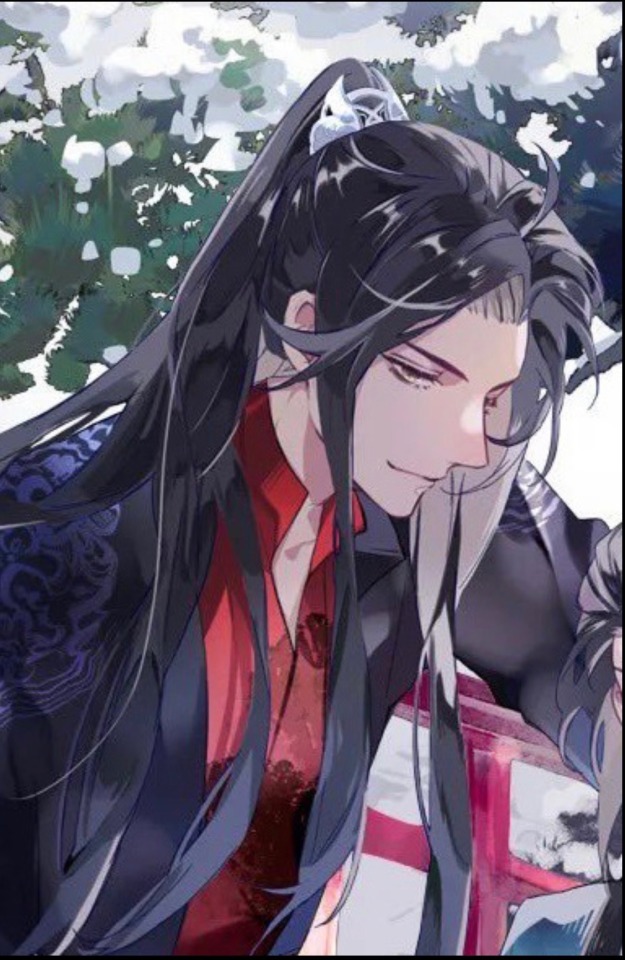
A character being totally canon LGBTQ+ and disabled was not required to be in this competition. Please check qualifications and propaganda before asking why a character is included.
Check out the other polls in this wave and prior here.
Mille Roper-The Arcadia Project
Qualifications:
She has BPD, which is a rarely represented disorder as it is, and is also a quadruple amputee, and she's one of the best characters with BPD I have ever had the pleasure of reading about. She is also canonically bisexual!
Propaganda:
GODDDDDD Millie she is one of my favorite bisexual, borderline, and amputee characters ever and when it comes to bi and BPD rep, she reminds me frankly of myself....I love her so much I need to reread borderline
Wen Kexing-Faraway Wanderers / Tian Ya Ke
Qualifications:
1. The LGBTQ+ part: he is canonically a gay man. (Though he does not identify by this specific word due to being from, yknow, fantasy ancient China, he is very vocal about only having interest in men / not having interest in women.) He is also one half of the main (canon, mlm) couple in the book. 2. Disability part: he has complex PTSD, with dissociative symptoms being most prominent. It's not articulated as clearly as the gay part, but there's a lot of textual evidence. For example, for his bouts of dissociation, he has a clear trigger - thinking or talking about personal loss (mostly his initial traumatic event, brutal murder of his parents when he was a child, but at least once it was fear of losing his partner), - and there's a very distinctive way the author describes it: "far-off gaze", "blank" expression or eyes, being "in a daze"/"dazed" were all words used more than once in those situations. He also exhibits symptoms of depersonalization, especially in contexts of violence. The one that made it click for me was a moment when someone was striking to kill him while he couldn't defend himself, and he was described as being calm "as if the one about to die was not himself", but there are also smaller hints, like several times he is described as 'fighting as if he doesn't notice pain and exhaustion' - which I would not take as evidence on its own, but tied in to other dissociative moments of his... yeah. 3. Last thing, in case you aren't sure PTSD/dissociative disorder should count as a disability, I want to make my argument that it should, as it noticeably impacts the character's quality of life. Both continuously (he mentions, for example, sleep problems/insomnia - that clearly stem from his traumatic experiences) and at specific moments (like that time he started dissociating in the middle of the battlefield, nearly resulting in him getting killed........)
Propaganda:
Okay, imagine a classical Chinese martial arts story. Young orphan meets a mysterious master, who imparts all his knowledge upon him; the boy trains hard and challenges various villains, until making it all the way to the final boss who was behind everything. Now, imagine if, in the very beginning of this story, the final boss accidentally ran into that mysterious master. And became suspicious of him. And began following him under pretense of falling in love with him at first sight. And then fell for him for real. And then they had adventures and also started co-parenting that young orphan.
THAT is the plot of Tian Ya Ke. And the final boss in question? Well, that's Wen Kexing I'm submitting! And yes, Wen Kexing and Zhou Zishu - the aforementioned mysterious master and the main character of TYK - are a canon couple. Wen Kexing in particular is very, ah, out and loud gay. Gay and making it everyone else's problem even. So that's the LGBTQ+ part. (Also they are SUCH a couple. They're so funny! The whole circus! And then they do something and you are like oh yeah right. each of them is a villain of a different story. Good thing they decided to play house instead.) On the disability front, Wen Kexing has mental health stuff - to be specific, complex PTSD with signs of dissociative disorder. I'm not gonna describe his wide array of traumatic experiences on the form because it needs SO many trigger warnings, but the important part is how those impacted him. For example, he mentions having sleep problems/insomnia due to fear. (Which made the fandom lose our shit once we connected it to the earlier moment where he, in a vulnerable state, drags himself to Zhou Zishu's side and falls asleep on his lap. The! Trust! That! Shows!) He also dissociates frequently when thinking/talking about his initial traumatic event. Which is my favorite part of the portrayal of his PTSD because... you know how there's this trend in media with superpowers/magic when the character's trauma response is portrayed through their powers, like their powers going out of control? And TYK went 'yeah, no, when /our/ OP final boss has a ptsd flare up, he just dissociates like a normal person'. (and I, a normal person who also copes by dissociating, was like 'i owe u my life'.) Also, I think it's great that not all of his episodes are plot relevant. Like, in four out of five cases it's just something that happens (the narration / pov character makes note of it), and then the scene moves on - so it feels like a feature of his character, as opposed to a plot devise for creating situations. And the one case where it does happen in an action moment - when Wen Kexing gets revenge on the person responsible for his initial trauma and promptly starts dissociating in the middle of the battlefield, and someone else has to step in to prevent him from getting killed by other enemies - kinda highlights the disability aspect, imo. Like, it shows that PTSD creates barriers for him where a person without it wouldn't have any.
Anything Else?:
1. It's a Chinese novel, so character names are written down with surname first. So Wen Kexing = surname Wen + given name Kexing. 2. There's a live action adaptation of this novel, called Shan He Ling / Word of Honor, but it's uh. well. The portrayal of Wen Kexing's trauma and PTSD in it is. Bad. 'Completely butchered everything I thought was refreshing about it in the novel' bad. (please understand i hate everything about the adaptation and am barely refraining from infodumping about how much I deplore it here) So if WKX makes it into the tournament and none of the images I sent work for u, pls at least don't use the live-action version? He is practically a different character there!
#polls#poll#disabled characters#lgbtq characters#disability#lgbtq#lgbtq dcs round 1#lgbtq dcs wave 5#mille roper#the arcadia project#wen kexing#faraway wanderers#tian ya ke#id in alt text
15 notes
·
View notes
Note
5, 17, 27, 29 :D
ILY! Thank you! 🤗💕 (AO3 Wrapped! Send me some numbers and I’ll post my answers!)
5) What work of yours got more feedback than you expected?
Probably The Heart of a Man. My whole Orpheus/Eurydice series was never very popular, not many people read it, but I was really attached to the idea so I wrote it anyway? But I had quite a few people this time around tell me they loved the s4 Buck POV half of it. So that was surprising and very nice! :)
17) Your favorite character to write this year?
Eddie in general is my favorite! But I also had a lot of fun writing Karen and Ramón.
27) What do you listen to while writing?
My furry children screaming at me that they’re starving even though I fed them 10 minutes ago? 🤣 Which is not a planned thing but is what always happens. Sometimes I’ll put on some kind of rain or ocean sounds or something instrumental though. If I put on anything with lyrics, I’ll get distracted and want to sing with it.
29) Favorite line/passage you wrote this year?
ajsdklf This is a hard question. I am very partial to Eddie from The Definition of Love ( “All I know about the kind of love you’re asking about? Is you. Love, to me, is you.”) Because damn Eddie always has the best love confessions omg.
But I also liked writing all the mythological fantasy imagery in the Orpheus & Eurydice series. One of my favorite lines being ( Buck flinches, hit with divine lightning meant to divide and tear in half. ) for the moment Eddie gets shot because it’s an allusion to the Symposium and the Origin of Love story and I thought it was fitting for the epic love story I was going for in that one.
But also?? There aren’t very many things I’ve written more fun than this part, from Eddie vs Feelings, drunk Eddie & Karen 🤣
“You had a girlfriend for two months or something, didn’t you?” Karen asks him suddenly. As if she’s just remembered. Her forehead gets crinkled and confused.
Eddie was crinkled and confused. His head is a little foggy but he’s pretty sure it was longer than two months. Far too long.
“I didn’t buy that. At all. Ask Hen. When she told me, I swore. Swore she was lying to me. I told her. You, Hen Wilson, are lying. To your wife,” Karen’s tone is the most affronted and she’s so funny. Eddie loves being her friend. He loves that she and Hen are married and happy. It’s nice that two women can be married to each other and happy together. “But then we stalked Annnn-esthesia? Anaemia. Analog? Anachronism! No, no Anathema’s social media. Just a little. We found pictures she posted of both of you. And what does Denny say? Bad vibes. Those aren’t the vibes.” She hums dissent and shakes her head. “I said, that? You and Anaphylaxis? That was all wrong. Didn’t buy it. Nope.”
“I…” He looks at her, and she is a very smart scientist. Rocket scientist. She does actual rocket science. Maybe she would know. She knows all the things. “Do you think I’m…” What’s the word? What’s his question? He has so many questions. “Do you think I’m like you? But with men? Do you think I should be kissing men?”
She giggles, sips her mostly empty glass, and then frowns hard at it when she finds it without wine. “Do you think you should? I didn’t like it. Men are bad kissers. I only kissed two. But they were bad. Teenage me didn’t know. Very sad for poor teenage me.”
“I kissed a woman once. My…” What was she? Besides heart palpitations and gasping for air and chest pain and dizzy, bad, falling over, feeling faint? “My girlfriend? I guess?”
“Anamorphic, Anatoxin,” Karen says. “Yes, her.”
“Yeah. Her. And I really didn’t like it.” Maybe because she wasn’t Shannon, but maybe because she was Ana. Maybe because she wasn’t Buck. He loved Shannon. He loves Buck. He did not love Ana. Anaemia. Anathema. Whatever.
9 notes
·
View notes
Text
Baseless Ferengi headcanons no one asked for and that get increasingly queer-navel-gazing and self indulgent because the horrible space goblins have consumed my brain:
- Mobile ears, because if hearing is so well developed and important to them they should be able to aim those big stupid radar dishes. Also because then they can emote with them and that's cute. THE AESTHETIC IS PARAMOUNT.
- Since they canonically sharpen their teeth with chew sticks and sharpeners, their teeth must grow continuously. So I submit: subcultures that let certain teeth grow out as a fashion/political statement. Ferengi punks and anarchists with 5" tusks. Ferengi with all their teeth filed flat (mom and dad HATE it).
- Corollary to the above, most of their teeth are crooked. At the least, they don't share our fetish for straight teeth. What if their teeth are deciduous, and there's no point in trying to force them into perfect alignment, since they'll just fall out and get replaced? So like, sharks but their teeth can also grow longer with no limit. WHAT HAST EVOLUTION WROUGHT ON FERENGINAR :V
- Parents nagging their kids to sharpen their teeth "or they'll grow up into your brain and you'll die :)"
- Personal space? Don't know her.
Okay I need a cut because there's too many now. WHOLE SOCIETY OF GAY HOMOPHOBIC UNCLES AND AUNTS GO I HAVE A PROBLEM
- I can't remember who on here put forth the idea of them having retractable claws but Yes. :3
- Pushing back against the worst canon episode a bit but: relative ear size being the only obvious sexually dimorphic trait, and even that having enough of a gray area that the only way to be 100% sure you're talking to a male or female Ferengi is if you do a blood test. Unless they're intersex! *shrug emoji*
- This is why they're so fanatical about gender conformity and their Victorian "separate spheres" attitude to men and women's roles. Capitalist patriarchy is fragile! And as artificial to Ferengi as it ever was to Humans! (self-indulgenceeeee about gender shiiiiit)
- You know how with domesticated rabbits, the rabbit getting groomed and paid attention to is the boss? Yeah. Go ahead and paint your bestie's nails, just don't be surprised if she cops a little bit of an attitude with you from then on.
- Their fight/flight/freeze/fawn instincts skew heavily toward the last three, and what a lot of other species read as annoying sucking up is the Ferengi in question feeling anxious and unsafe. Especially if they don't feel integrated into the group. Even being at the bottom of the pecking order is better than not being in the flock at all.
- If they DO opt for fight, it's ugly and typically their last resort. Bites or scratches will get infected without intervention-- microbes that their immune system can handle could cause big trouble for aliens. You might wanna check for full or partial teeth that break off and get lodged in the wound, too.
- Too many of these are tooth related but I don't care. :B More teeth stuff: you know what else has teeth that grow constantly? Puffer fish. Likewise, Ferengi can chew up mollusk shells as easy as potato chips, and they need the minerals for their teeth. (Imagine grandpa Sisko offering Nog a crayfish for the first time and watching as he just...pops the whole damn thing in his mouth and crunches away...)
- Their staple foods seem to be grubs and other arthropods, high in protein and fat. I've unilaterally decided their cuisine also involves a lot of edible fungi, ferns, plant shoots and seeds. Gotta get those vitamins. Overall flavor profile leaning toward umami, vegetal, and fresh herbs, and pretty mild (or "delicate" if you wanna be snooty about it, which a Ferengi probably would let's be real).
- Not much sugary food. I'm basing this solely on Quark's aversion to root beer as "cloying". Which could definitely just be his personal preference, but most of the people I hear hating on root beer cite the actual sassafras/sarsaparilla flavor (saying it tastes like medicine) not the sweetness. Nog might be the weirdo outlier for being able to enjoy it.
- Their home planet isn't bright and sunny, so their eyes are better at discerning shades of gray in low light conditions, with relatively weak color vision. Which could explain why they dress Like That.
- Conversely, human music has a reputation for stinking on ice because a lot of it is juuuuust lightly dissonant or out of tune because we can't pick up flaws that small. Ferengi can, and it drives them up the *wall*.
- Music? So many different kinds. Traditionally, maybe lots of percussion and winds, and water as a common component of many instruments to alter pitch or tone. Polyphony out the ass. Some of the modern stuff is an impenetrable wall of sound if you're not a species with a lot of brain real estate devoted to processing sounds. Pick out one melody to follow at a time.
- Yes, back to teeth again I'm sorry. It's a sickness. At some point in their history, pre-chewing food was just something you did for your baby or great grandma as a matter of necessity. Possibly your baby gets an important boost to their immune system and gut biome from your spit. At some point takes on a more formal intimacy aspect and gradually drifted from something all adults and older kids do to something only women do. Your husband and older kids have perfectly functional teeth, but you love them, right? =_= (Think old memes about husbands being useless in the kitchen if little wifey isn't there to cook, but even more ridiculous. Ishka was right about everything but especially this. Thank you for making your family chew their own food, Ishka. Not all heroes wear capes. Or anything!)
- How did they get started on the whole men: clothed vs women: unclothed nonsense? My equally stupid idea: men just get cold easier. Those huge ears dissipate a ton of body heat. Cue Ferengi cliches like "jeez, we could be standing on the surface of the sun and my husband would put on another layer." At some point, again, this got codified and pushed to ridiculous extremes in the name of controlling women and keeping everyone in their assigned box, to the point that women just have to shiver if they really are too cold and men have to pass out from heat stroke if the alternative is going shirtless, because That Would Be Inappropriate.
- Marriages default to five years, but they're also the only avenue for women to have their own household or any stability. Plus their religion places no emphasis on purity save for pure adherence to the free market and the RoA. So, curveball to the rest of their patriarchal bullshit: female virginity isn't a concern in the least. Bring it up and they'll rightly side-eye you.
- Family law is absolutely bonkers and lawyers that specialize in it make BANK. I feel like custody would default to the father usually but oh wait, the maternal grandfather has a legal stake in this, too, and your next father-in-law is asking HOW many kids are you dragging into my daughter's house, etc etc. Growing up with a full sibling is way rarer than growing up with half or stepsiblings, since it usually takes both men and women two or three tries to find someone they vibe with. (Not love, unless you're super cringe.)
- A misogynistic society is a homophobic society. Imo those flavors of shittiness just come in pairs. Homosexual behaviors are fine within certain parameters (aka "always have sex with the boss") but not on your own terms. To add spice, bisexuality is their most common mode (because I'm bi and these are my hcs for my fics I'm not writing, so there), but capitalism demands fresh grist for the mill so you better get het-married and pop out some kids you lowly peons. You have a choice so make the proper one. :)
- Corollary to the above, that doesn't keep all kinds of illicit "we're just friends with quid-pro-quo benefits for realsies" affairs of every stripe and every gender from going on everywhere. Many Ferengi have a lightbulb moment somewhere in early adulthood when they figure out their dad's business partner or the "auntie" who visited their mom every month had a little more going on.
- Plus there's way more gender non-conformity and varying degrees of trans-ing than the powers that be have a handle on. Pel isn't unique, even if most would have to somehow make it out into space to be able to thrive.
Damn a lot of these are just my personal bugbears plus THE GILDED AGE BUT WITH HAIRLESS SPACE RODENTS ain't they
- Women can't earn profit, okay. But lending or "lending" things to each other isn't commerce, riiiiiiight? To be assigned female is to master navigating a vast, dizzying barter/gift economy. Smart boys and men leverage this, too, and there are splinter sects that view this as the purest expression of the Great Material Continuum.
- Of course plenty of women make profit anyway, and just do their bast to dodge the FCA. The tough thing about insisting on using latinum as currency is that cash can be so hard to track, you know?
- Because of the RoA, guys are discouraged from doing favors or giving gifts without setting clear expectation of getting some return on investment. This can twist into an expression of friendship (and of course women do it too), and the ledger will keep cycling between debit and credit among friends for decades. A common mistake aliens make is to tell them recompense isn't needed without explaining why, or return their favor or present with something that zeroes out the debt. The Ferengi will assume you want to break off the friendship. (I cribbed this from dim memories of an African studies course I took in 2007 and whose textbook I know I still have but I can't frigging find it...)
- Flirting, they do a lot of it for a lot of reasons. Roddenberry made it clear that they're just straight up pretty horny, but there's no reason it can't pull double duty for building alliances with other people, smoothing over feuds or disagreements, or cementing friendships. Ferengi who are ace and/or sex-repulsed are possibly viewed similar to the way we'd view someone who's "not a hugger/not big on touching" and if they flirt just don't get offended if it doesn't go any further; aro Ferengi don't garner much comment aside from an occasional "wow how badass, never falling in love with anyone."
- where to even start on making sense of the Blessed Exchequer??? Like seriously, what is this literal prosperity gospel insanity, I need to force myself to re-read Rand and like, some Milton Friedman for this shit. Help.
- fuck I'm probably going to actually do that, RIP me...
#ds9#star trek#meta#ferengi#i love them Too Much help#reliving my brief libertarian phase from high school from the opposite direction#my heart wants to make them simultaneously as queer and as repressed as possible#i didn't even make it to the goddamned blessed exchequer my head is too full#i will find beauty in this vulgarity if it kills me#this is too long#why did i spend my time this way
138 notes
·
View notes
Note
the term malewife isn’t a very nice term to use...
A man who acts as a wife and is inferior to his #girlboss girlfriend.
Person A: I just got myself a malewife. He's gonna clean my kitchen and watch me download custom content for the sims.
Person B: Sweet! You must be such a girlboss
^^urban dictionary. It’s just confirming to the sexist stereotypes that perceive and expectation of what a wife should act like. It’s quite harmful
It's a parallel to girlboss which is conformity to the sexism within corporate America:
"it becomes inescapably clear that when women center their worldview around their own office hustle, it just re-creates the power structures built by men, but with women conveniently on top. In the void left after the end of the corporate feminist vision of the future, this reckoning opens space to imagine success that doesn’t involve acing performance reviews or getting the most out of your interns." (here)
The word girlboss comes from a book quite literally called #girlboss, in parallel to the negative aspects of this book people eventually rebranded the term "malewife" to parallel it (malewife was originally an nsfw type thing)
In the malewife/girlboss "system" it's essentially the swapping of the problematic aspects, expectations, and socialization of men and women within a relationship
"Girlboss, gaslight, gatekeep" was a meme started to pick on the idea that women should become men and enforce the sexism within corporate society, and I'm sure it was a jab at the book the word came from as well.... "Manipulate, mansplain, malewife" was created to parallel the original meme
So yeah, the whole concept is mocking sexism within corporations and and modern relationships and showing how ridiculous it is. Girlboss mocks the idea of 2014 (largely) white feminism within America.
In example the original meme (created on Twitter) is intended to make mockery of Karen-types:

On January 12th, 2021, Tumblr user missnumber1111 posted, "today’s agenda: gaslight gatekeep and most importantly girlboss," garnering over 43,500 notes in a month (shown below). On that day, Twitter user @CUPlDL0VE posted, "my agenda is gaslight gatekeep and #girlboss," the first instance of the phrase on Twitter.
And a day later on January 13, 2021 Tumblr user a-m-e-t-h-y-s-t-r-o-s-e reblogged the post along with a photoshopped image of "Live, Laugh, Love" wall art instead reading, "Gaslight every moment, Gatekeep every day, Girlboss beyond words" (shown below). On January 18th, the image was reposted to Twitter for the first time.
Malewife doesn't hold those same implications however... The term malewife which is now being used to parallel girlboss achieves it's origins from p*rn, now I'm not an nsfw blog or someone who blatantly discusses nsfw concepts on my blog so I'm not getting super into it but there's a few places it comes from: femdom, bdsm, and feminization kinks... All of which have a connection to queerness in their own right but I don't feel comfortable going into the complexities of that with so many younger people following me.
On February 15th, Tumblr user @relelvance posted, "Manipulate, mansplain, malewife" as a male-themed opposite to "gaslight, gatekeep, girlboss," garnering over 27,000 notes in four days. The post was screenshotted and reuploaded by Twitter user @nortoncampbell on the same day, garnering over 14,200 likes and 2,800 retweets in the same span of time (shown below).
Urban dictionary's explaination of "malewife" is not only harsher than what malewife was intended to mean, but also removes the context of origin from the word- making it something new, different, and erasing the history of who originally used this word.
Because of Malewifes origins vs Girlboss origins, malewife is a less problematic term than girlboss and is more "affectionate" because the term malewife and it's use (up until recently) involved the man acknowledging that he wanted to be the "wife" in his relationship. There's a variety of reasons someone might do this, but it can generally be summed up as a mixture of personality and also personal wants.
I do think it's important to also note that although these words are being "glamorized slightly" they're still intended and being used in a memeing manner, but they're also used to quickly denote arbitrary traits in an individual and categorize those traits...
Although there's lots of conversations to be had for a variety of reasons about the origin and use of the word "girlboss" in relation to sexism, up until recently the world "malewife" was something claimed by men, something men wanted to be called, and something that men who used the term wanted to reference them.
Malewife is about "stepping-up" to "take on" "female" social roles, and it's something that at least some women would be happy to see in society:
"...We have been told that we can have it all, but so far we have noticed that it is extremely hard work having it all, because you still have to do everything that your mother did but now you have to do everything your father did as well. Except that your father had your mother waiting at home with a gin and tonic and his slippers when he came home from work, and you have the washing up and the shopping and a few screaming brats as well as a bloke with his feet up on the sofa watching the football... " (via. Victoria Mary Clarke)
And I don't think that she's wrong at all. Women are still expected to do so much more than men in society without equal reward.
Malewife exists as a a sort of fantasy removed from the truth of society. It's an idea that a husband can be waiting at home to care for his wife, and in this instance it benefits the woman- unlike Clarke's situation above, the woman comes home from a long day and is able to relax without the pressures of society and her life.
Where housewife is a word that holds its origins in forced subservience, malewife is a term that is showcasing men "picking up the torch" in regards to housework- where housewife is socially forced, and girlboss is reversed social compliance, malewife is the rejection of social expectations.
Malewife is about men finding a place in their life's and relationships to make themselves more than a paycheck. To say "I can be emotionally there for my spouse, I can clean a toilet, and drive kids to school, and I don't treat my spouses wants as something expendable". In a society in which men are often demeaned, mocked, and scorned for picking up socially female roles (say hello to misogyny and gendered contamination!)
The Urban dictionary definition, is not only too harsh- but not the way in which the word is intending to be used, because that's ignoring the origins of this word, and the fact that men had a choice in becoming malewifes where women didn't have that choice. It should read more like:
Person A: Ah yeah, I have a malewife waiting for me, he's going to clean my kitchen because I've had a hard day at work and need a break, and then he's going to watch me download custom content for the Sims because I enjoy the game so much and it helps me take a break from life!
Women's wants were often ignored in favor of men's wants, so by the malewife saying he's going to watch his spouse play the Sims, he's really saying "I care about her interests" and by him picking up the kitchen cleaning after she's had a stressful day he's saying "I have a lower stress job so I can handle that for her and make her life a little easier" (because malewife doesn't mean he doesn't have a job).
In a society in which a man's worth is tied to his ability to bring home money and be emotionally distant, malewife is the rejection of this norm. Malewifes are going to be there for their spouse, they're going to step up and take on traditionally women's roles and they're doing it because they want to, because they like it, and because dividing chores into pink vs blue is wrong.
I also want to say, you can't flip a word around and say it does "this" because that's not how it works... Men and women are forcibly socialized in very different ways, the two binaries have very different treatment, and expectations within societies social constructs. If you could flip the forms of oppression that men vs women face (because yes, the patriarchy oppresses men) then you could also flip the forms of violence faced by trans masculine people vs trans feminine people- but that doesn't work either, because women will always be oppressed in the most public way to "make an example of them" while the patriarchy expects anyone who is male to "keep his mouth shut and fall in line". (I know that's worded poorly, but I've just written at least a couple hundred words and my brain is a bit fried already from various other things today- basically anyone perceived female or male will be treated in a certain way as a result of others perception of them)
Anyhow, all this isn't to say that the term "malewife" is inherently free of any form of flaw ever... Malewife is a newly mainstream word, it wasn't popularized until February 15 of 2021... So?? 5 days ago?? The origins of malewife and the social implications of malewife combined with the history of the word, don't make the word bad or impressive and it's not "upholding the ideals of a housewife" but instead a word which provides men freedom from male social expectations.
Can the word malewife come to be a word which enforces expected female social behavior? Yeah it absolutely can become a word to mean that, erase the history from the word, and give it to someone who doesn't know the history of the word, and someone who doesn't have an intimate understanding of gender theory, and you've got a recipe for hundreds more asks like the one you've sent me...
I can't find a single positive reason to use the word girlboss in an empowering way, but I can find more reasons to use the word malewife in an empowering way than not to do so.
So at the very least if all you come away from this with is that I don't personally use the word malewife to uphold female social expectations in a relationship but instead I use this word to provide space for guys to be allowed to be feminine, soft, caring, emotionally present, and worth more than their monetary value, then I guess that's okay.
184 notes
·
View notes
Note
Main Issues with Feysand's leadership: it mostly consists on rather inmature, underdeveloped strategy that would in no way get a world leader very far in the real world (see: 'i schooled my face into a look of boredom'), seem content in making enemies left to right as long as they never have to step down from the pedestal that they've built, and see Illyria as a necessary evil, like wtf. In conclusion, Rhysand is a governor for Velaris, but is not fit to be the ruler of the Night Court.
Rounding caveat, because I know I’m going to get shouty: the dividing line between ToG and ACOTAR is that tog is a fantasy series with romance, and acotar is a romance series in a fantasy world. They’re not the same. I’d be totally fine with how the world building in acotar is v handywavy, because it’s still accomplishing what the books set out to do (tell a love story, hello acomaf) but- BUT, it’s not consistent. And that inconsistency wildly undermines the characters.
And god, if Rhysand as a ruler isn’t the heart of ???? spirit.
We’re not going to talk about how the plot of acotar only makes sense backwards (Hey, Rhys, why did you want to kidnap every month a powerless mortal girl???), we’re just going to talk about reputation.
So Rhys is a villain who we learn isn’t actually evil. A classic. He was made to do terrible things by Amarantha! He sacrificed himself to save his friends! Of course the High Lords hate him, they think he sided with the enemy.
That could have been the whole thing- the layers pulled back, Rhysand also a victim, a reason for the world to hate him but for Feyre to see otherwise.
OKAY BUT- then we learn? that Rhysand has been playing Evil Scary Jackass in all political situations? for his entire reign? that’s just what he does?
Round two: Rhys had to be Amarantha’s because he had to “shield the knowledge” of his friends and his capitol? city.
BUT- other people Under the Mountain, also accessible to Amarantha, know the IC??? have been acquainted with them for years? They’re not a secret. Mor was almost married out, Az and Cas are legendary, Amren is a story people tell.
And all those people are probably incentivized by the fact that, you know, they think Rhysand is an evil traitor.
Furthermore: guess who willing cooperated with Amarantha? The Court of Nightmares. Recall who, surprise in acowar, knows all about Velaris: Keir.
Round three: Sexy Evil Cosplay, wherein we learn that not only instead of just keeping it together in politics Rhys has adopted an entire secondary persona, we learn he also...uses this persona...to scare all the other highborn faeries into submission....so he? never has to talk to them?
BUT ALSO: this whole thing is undermined by, once more, Keir.
The whole game on the throne is to instill fear/ control of Keir. The whole Second Face. But Keir knows about Velaris? Keir knows exactly what Rhys stands for because Rhys and Cassian tried to rescue Morrigan from the Court of Nightmares when they were teens. Hell, Keir probably knew Rhys when Rhys was a kid.
It’s almost like eventually the person you pretend to be becomes who you are.
I think the Political Rhys vs Real Rhys started out as a plot point, but in character became this: not someone separate at all, but actually, Rhysand’s coping mechanism for making shitty choices.
See: if everyone in the Court of Nightmares bows, I’m ruling them. It doesn’t matter that women are being sold, that there’s servants and presumably totally normal people trapped in a mountain they can’t leave with people I think are monsters.
Let’s jump to Illyria.
How much easier is it, for Rhysand, half-Illyrian himself, to align wholly with the High Fae and say: no, it’s Illyria’s fault. They’re savages, they’re barbarians.
Easy as being a dick to other powerful men because it’s fun when they can’t fight back.
If the blame isn’t his, he keeps his army. He doesn’t have to fight a civil war that might swallow him whole, considering Illyria is the army he controls vs the High Fae soldiers left entirely under Keir’s rule.
If it’s Illyria’s fault he can successfully reimagine the past as he clearly needs to (someday, I’ll make a whole ass post about Rhysand’s mommy issues and how they creepily bleed into Feyre’s characterization, but one thing at a time).
If it’s Illyria’s fault, he can’t be mad about his Mother, daughter of a warrior race, offering him up for brutal, dangerous training. It’s the fault of Illyria. He doesn’t have to imagine he was learning those things, fighting in the mud, because it was the only way his mother could pass the legacy, could say, look, this is where I come from and someday you will have the power to make it better for your sister, for everyone.
He LOVED his mother. He wears the sacred tattoos, manifests wings, has Illyrian “brothers”.
But- It’s Illyria’s fault, so Rhys didn’t fail, Rhys is doing his duty by keeping them in line.
Which brings us to the war.
I’m unclear on why only the Night Court knew Hybern was coming, but let’s just accept that.
But it’s all about the Public Face, moving in the shadows, the two Rhysands. So for the months Feyre is wasting away with Tamlin, planning her wedding Rhys...doesn’t warn anyone. Doesn’t whisper to the other High Lords to shore up defenses.
He makes a plan contingent on 1)that creepy deal with Feyre that he can now both justify and doesn’t want to enforce knowing she’s his mate, and 2) long lost magical objects no one knows the location of, and that don’t belong to him.
Rhys got SO used to the All-Knowing Dickbag face, it’s like he started believing he was all knowing. He’s one of seven Lords, but he doesn’t talk to any of them, on the off chance they don’t do exactly as he says. He steals from Tarquin, a young High Lord kind enough to take a chance on him. He tricks Mor. He lies to...everyone?
And then it’s a big deal, a failure on their part, when at the FINAL HOUR AND LAST MOMENT BEFORE ALL OUT WAR, AFTER THE SECOND INVASION HAS ALREADY COMMENCED, when the High Lords don’t jump to trust Rhys.
A step back, a Feyre tangent: Feyre, younger, also deeply traumatized, falls into this hard. Rhys tells her he’s the underdog, and she believes it. He’s SO SO SO powerful he can take the voice of another High Lord, Feyre herself thinks he’s so magical the gap between him and his contemporaries is like that between humans and high fae-
But hey wait, they don’t trust him because he’s been a dick for five hundred years.
But hey wait, they came as their true selves, they don’t trust him while he’s WEARING ILLYRIAN WINGS- IT’S BECAUSE HE’S DIFFERENT-
No, it is not, but Feyre’s POV sort of wants us to think so.
And that’s where everything sort of falls apart.
The act of power has stopped being an act- it’s just their actions now. And they do not know how to stop.
Because they are in control, and they have to go on for the war. They have to keep making decisions, even if they’ve lost the thread, because they want to survive.
But they do survive.
And it turns out, even after that, they can’t put down the masks fused to their faces, because the act is the only thing keeping them together.
So the balls to the wall, We Must have the High Ground Even at Our Own Dinner Parties, The Center MUST Hold shit just keeps going: tearing down Lucien because he chose something that wasn’t their Court. Letting Illyria crumble because they don’t need the army right now. Banishing Nesta because she’ll never bow to authority.
All the weird, incestuous feeling inter IC drama.
But they’re the underdogs! the Heroes! It’s not their fault!
So they spend their time in Velaris, charmingly hanging out like they’re normal people, thinking they’re better because power is wielded on an unimaginable personal scale.
Rhys loves his people! Rhys sacrificed!
Rhys...careened from one war/disaster to the next, and then settled down to play house?
The narrative cannot decide: is Rhys really an underdog, devoted to his people? How about he helps every other city that Amarantha destroyed?
Is Rhys a Normal Guy who just wants to walk on pretty cobblestone and have a cute, happy family? Maybe, there should be a government so he isn’t solely responsible for everything?
Is Rhys the Lord of Darkness Redeemed by LOVE? Cool, let’s have him maybe he honest with Feyre exactly once, OR, at least talk about how him dying made her go off the rails and try to fix that with a bandage that isn’t baby shaped before Feyre’s 22nd birthday.
Canonically, becoming High Lord is a mystical, magical endowment. That then, for the most part, functions as some kind of mashup Monarchy/ Feudal Lordship.
If that’s what it is, why can’t we lean into that? Rhys who does want a normal happy life with Feyre, trapped by the weight of immovable magic destiny.
King Rhys, duty bound to his bloodline and his people, torn between different ways to rule.
Hell, Rhysand who really is a monster, because maybe Faeries are monstrous by human standards, who shows Feyre the beauty that lies beneath the brutality in a magic, surreal world where everyone is terrifying, but even monsters love.
189 notes
·
View notes
Text
Misaeng review
Ok, it's been almost a week, so I feel like I can get my thoughts (somewhat) in order. As usual, I'm late to the party, given that Misaeng aired 6 years ago, and is already considered a kdrama classic. Still: thoughts!
(under the cut)
I came to this drama with quite a lot of expectations, both because I'd seen it on a lot of rec lists, and also because I'd watched director Kim Won-seok's Signal and My Mister, which are justifiably as beloved as Misaeng. I'm happy to report that Misaeng mostly lived up to those expectations!
The writing & direction work together to make Misaeng a very immersive experience, which is good, considering the entire run time is over 20 hrs. The level of seemingly mundane detail of the operational aspects of running a trading firm that they delve into (and other dramas might have avoided for sake of pacing) seemed odd to me at first, but eventually result in a world building that's incredibly well fleshed out. The (formerly unlikely!) high stakes of a misplaced piece of paper or octopuses in a shipment of squid end up being parts of an emotionally wrenching narrative whole fairly seamlessly. Still, at 20+ hours, Misaeng also does get into the kind of pacing issues that most of the slice of life kdramas I've watched so far have. And it didn't need to! I think it had a wonderful ensemble of characters, and if they'd maybe given a little more time and space to characters other than Jang Geu-Rae (Im Si wan) and Oh Sang-sik (Lee Sung-min), the mid portions may not have felt quite so, well, stuck.
But more than the strong writing and direction, it was really the actors who delivered. They made what could have easily been a dull-ish office drama into a heart warming story about human connection and the joys and troubles of leading an "incomplete life". I'd never watched Lee Sung-min in anything before, and about half way through the series I was like, HOW IS HE MAKING A SHORT TEMPERED, ALCHOHOLIC MIDDLE MANAGER SO SEXY? Like, serious props, dude. Lee Sung-min is by turns annoying and brash and too shout-y and stubborn and funny and so incredibly vulnerable as a man trying his best to live by his principles in a world that thinks they are an impediment to "success", that you forget that he's playing a fictional character-- he's someone you know, he's someone you've seen in the mirror.
His performance as Oh Sang-sik is very ably matched by Im Si Wan's Jang Geu-Rae. This series would not have worked if these two actors didn't have the chemistry they do, and play off each other in every scene. I had watched Im Si Wan recently- in JTBC's "Run On", in which I liked his performance quite a lot, but I absolutely loved him as the naive and endearing Jang Geu-rae. Misaeng, is in part, a bildungsroman narrative centered around Jang Geu Rae. Im Si wan brought a kind of vulnerability to the role that might have felt cloying and emotionally manipulative in the hands of other actors, but Im Si-wan manages to do it with a light touch. I feel he's one of those actors that uses his whole body in a scene, not just relying on facial or verbal expression, and it's a joy to watch.
Each of the other actors in the ensemble also bring that dedication and talent to their roles, even if it's in a single scene. There are lots of one-off characters that we meet during the course of the series, and every single one of them leaves an impact.
But! I'm going to pick a fave from the supporting cast and that's Byun Yo-han, whom I'd last watched as the broody, troubled (and very sexy) swordsman Lee Bang-ji in Six Flying Dragons. I can't imagine a character more in opposition to that one than Han Seok-yul in Misaeng, but Byun Yo-han just knocks it out of the park as the scheming, cheerful and mostly inappropriate clown with a heart of gold; Han Seok-yul is the definition of Chaotic Good, and you're equal parts horrified by his antics- which include sexual harassment dont @ me -- and yet charmed by him. I wish they'd given him a few more scenes and a larger plotline to work with, but I also suspect that he might have just walked away with the entire series if they did that. (Am I plotting that series in my head as I write this? MAYBE.)
Alright, this is getting a bit too long, so I'm going to get to the bits that disappointed me. That's really one major thing: the gender politics. I don't know how different the show is from the web toon it's based on, so I can't tell whether they made significant changes to the basic plot and characters. As in- I have no idea if the webtoon was as male dominated in every way as the show is, so I'm not sure how much of the show's treatment of women as a class, and its female characters in particular, I should lay at the door of the original writer vs the screenwriter and director. I'm also lacking the Korean context in which this was written and made and aired, so you may take my criticism with a pinch of salt, if you please!
That the show features mainly male characters is perhaps unsurprising and realistic, since we know that the kind of corporate life it depicts is very male dominated, top to bottom. The show also portrays the very real and horrific overt and subtle misogyny that women face in the workplace and out of it; mainly in the character of Ahn Young-yi, played with steely determination and quiet suffering by the lovely Kang so-ra. There are only 3 other female characters that have any sort of real speaking role- Sun Ji Young (played by Shin Eun jung), a senior manager at the company, Jang Geu-rae's unnamed(!) mother (played by the amazing Sung Byoung-Sook) and Oh Sang-sik's unnamed (!) wife (played by Oh Yoon-Hong, who's a delight in every tiny scene she has). There are other women who appear but in very minor roles, and often in "comedy" moments that often rely on sexist tropes to start with.
Anyway, right there you can see one of the problems- 4 women characters that have any kind of real screen time, and only 2 of them are named. Aigoo! Screenwriter Jung Yoon-jung is a woman, and like, I don't like putting the burden on any one woman to y'know fix structural misogyny, but I can't also help feeling disappointed that she overlooked even this "small" thing among the larger things.
But that apart, the main issue for me was that while the show doesn't shy away from depicting egregious sexism in the form of sexual harrassment, verbal and physical and certainly emotional abuse, in a manner that's clear that we are meant to be horrified by it--it falls short of depicting how women deal and work with it. It just doesn't give enough space to women or their worldview.
It's very comfortable depicting victimhood, but doesn't put work into depicting the ways in which women survive by finding solidarity with other women. We have a scene or two where Ahn Young-yi who is this show's poster child for female victimhood interacts with the older women who offer sympathy and understanding, but no real strategy or support. And yes, we see men also being targeted by their seniors for the grossest verbal and physical abuse; and it's men who help Ahn Young-yi strategise on how to deal with her situation. Real life experience tells me that it's the women who do this work for other women. I have certainly been on both sides of this equation, for one, and so has every woman that I know in corporate life. And yes, one of the show's core philosophies is that those who endure, survive--but it is none the less extremely painful to watch Ahn Young yi "endure" the kind of abuse she does as a coping strategy and a survival strategy.
At the end of it, when she slowly manages to gain the support of her sexist team, it's shown as a victory-- though naturally imperfect, because this show takes its Realism very seriously (right until the end where it makes a tonal shift into quirky that I was a little ?? about)-- and y'know, sure, it is a victory. And I absolutely understand the choices she makes and why she does it-- I guess I just got annoyed by the fact that other antagonistic figures in the narrative get a more straightforward comeuppance for their egregious behavior, but Ahn Young-yi doesn't even get a goddamned apology from her abusers. Instead, we have a half humourous, half serious moment where she comments on how she's working at turning herself into "someone cute"- because she understands now that sometimes the right strategy is to "go with the flow". Be the water that slowly wears away at the rock. It's an interesting moment- the men she tells this to are taken aback by her bluntness, but also a little clueless about what she means. It's the kind of nuance that I would and do enjoy. Unfortunately, it also closely follows one of the show's most annoying scenes at the tail end of the series- where it tries to play off workplace sexism and misogyny as comedy- boys being boys-Reader, when I tell you that I had to WORK to unclench my jaw--!
I'm not saying we should have a single and obvious narrative of female emancipation. I'm not against realism in fiction, but god, sometimes, please do remember that when we look for escapism, we are actually imagining a better world. The first step toward liberation is allowing yourself to imagine it.
And the show does allow other characters its moments of unfettered fantasy- Im Si Wan parkour-ing all over the rooftops of Amman- and having a semi mystical + Indiana Jones moment in the deserts of Jordan--so why, I ask, are the women not given that gift?
*looks into the camera *
Tl;dr: I enjoyed it, it made me cry every episode, and I cared about all the characters, and if you haven't watched it yet, treat yourselves.
PS. Yes, Han Seok-yul is a disaster bi, sorry, I don't make the rules. Yes, hotties Oh Min Seok and Kang Ha-neul are canonically naked in a hot tub six feet apart because they are bros. Yes, I will be writing the fix it in which they fuck like angry bunnies. Yes, I am going to put my shipper cooties all over this gen slice of life show, deal with it.
22 notes
·
View notes
Text
传闻中的陈芊芊 thoughts
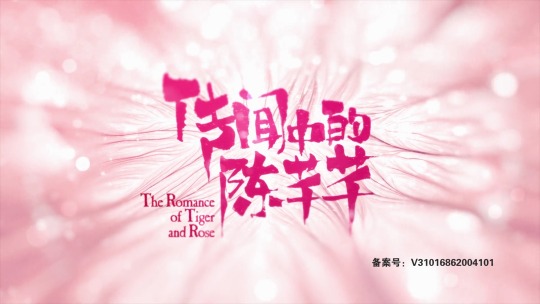
i haven’t been very active lately but i just came on to say, i binged on the romance of tiger and rose / 传闻中的陈芊芊 and have 2 eps left and i love it SO SO MUCH. i was expecting some pure crack but beyond that, i really ended up catching much feels for it?
and i think beyond the outlandish hilarity of some of the scenes and the cheeky meta, it’s actually a pretty decent drama with its plot and character motivations largely dictated by logic. i have to commend the scriptwriter nan zhen 南镇 for the entire set up of the drama (and it’s her original script!!! which is so rare in the industry nowadays run over by book adaptations - i mean i love those too but i still think it’s an easy way out for production companies when they adapt books with established fan bases). it’s actually really clever of her because all plot holes/flaws in world building can easily be attributed to xiaoqian’s lousy scriptwriting abilities?
i really did become quite impressed with the plot as the episodes progressed haha. the conflict and plot thickens as xiaoqian, now as qianqian, with the mindset that she’s not part of this story at all and that she’s interacting with a bunch of characters on paper, continues to engineer plot machinations trying to steer the plot in the right direction to get to the end so she can return back to the real world. and you slowly see how that just devolves into complete chaos and plot twists when surprise! she IS part of the story, she IS interacting with these characters and they are influenced by what she says and does! so you have her original male lead hanshuo, destined for the female lead chuchu, falling in love instead with her and changing his entire plan because of that. you have chuchu, the original female lead, slowly growing more unhinged as she perceives qianqian’s actions and words as callous and uncaring and outrightly antagonistic towards herself and as her resentment builds when everyone seems to shower affection and attention on qianqian still.
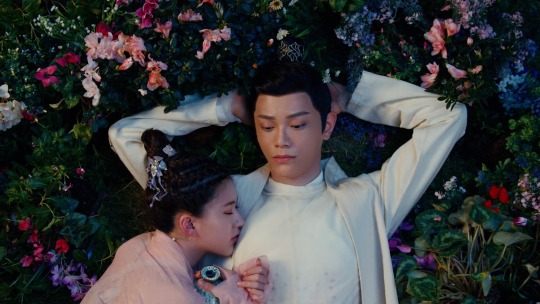
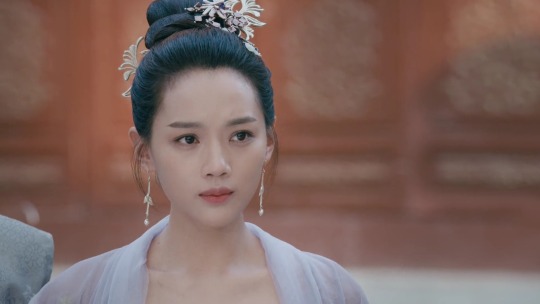
adding on to that is, how xiaoqian as a scriptwriter views and perceives her characters? some characters like hanshuo, she clearly constructed with much care and love, as seen by how she knows exactly how to make hanshuo happy and doesn’t want to upset him in the initial episodes (which caused him to fall for her like a devoted puppy). yet it seems like she either didn’t grasp fully their character motivations/personality/how their character is moulded by their backgrounds? which is why she probably didn’t see how the inherent difference with which her mother treats qianqian vs chuchu would lead to jealousy and resentment seeping in and poisoning chuchu’s heart. and her visualising han shuo as a murderous calculating career-driven male lead aka the male lead of eastern palace clearly runs contrary to how he is total putty and has barely hurt a fly ever since he fell in love with qianqian.
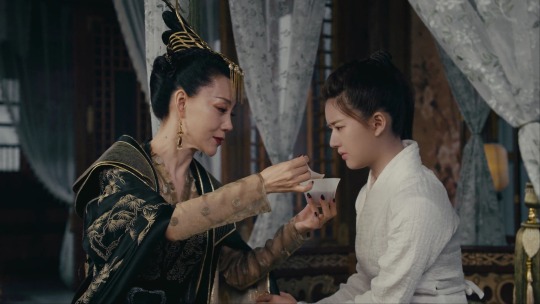
and there are characters too like her mother that she originally clearly just wrote in as characters to steer the plot forward, and in-world, she is clearly stricken when she realises how they have emotions and hidden depths beyond what she fathomed - like when her and her mother had that semi HTHT after she stole the dragon bone and her mum stayed by her bedchamber to watch over her all night. and another example would be su ziying - she’s so happy to see him when he appears as in that moment she’s viewing him from the lens of the scriptwriter of this story and she knows he’s going to push the plot forward. but seeing him and his actions actually playing out - she gets irritated by what he does and also his actions actually do end up affecting her, because she is in the story too!!!
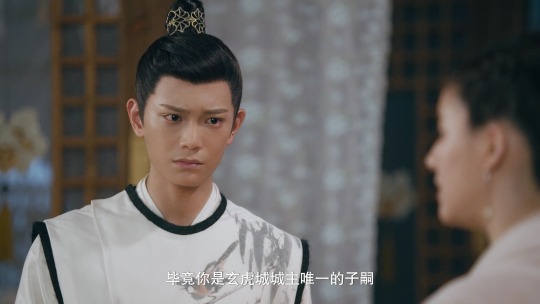
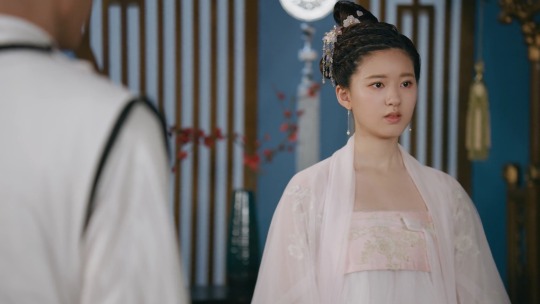
and moving on from that, as the plot further progresses, another spanner is thrown into the mix when she realises that male lead is really really in love with her! and would give up everything for her! and... she too is in love with him!! and this changes things too because while initially all her actions were to push the plot to move forward the way she originally wrote it so that she can head back, now she’s actively trying to push back against the flow of events, as she’s now emotionally invested in this and doesn’t want the male lead to die as per her original script.
the play out of all these was really really entertaining and gripping to watch?? i was legitimately bowled over by how affected i was when all the angst came in, because it really felt like it made sense amidst all the crack and was well set up? and throughout it all, the actions of all the main players in the plot made sense and were logical, even the secondary leads chuchu and peiheng. haha idek if i’m ascribing too much credit to this whole plot, maybe it’s really just meant to be a cracky fun time and i’m too into it HAHA.
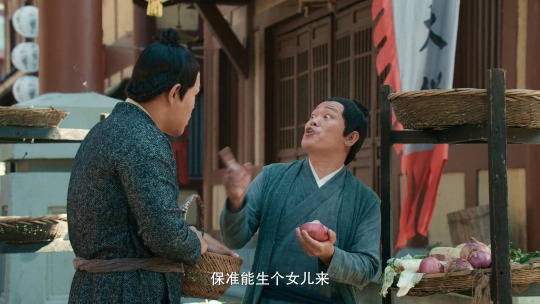

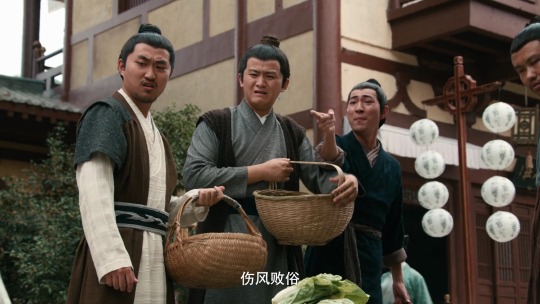
there’s also the set up of huayuan city being a matriarchal society where basically the roles of women and men are reversed. it is really v trippy!!! and An Experience to see scenes like men being harrassed by women, people tittering at other men for not being covered up enough in public, wares that can increase your chances of birthing a female heir being peddled on the streets. initially i was kind of apprehensive as to how it was going to play out. now at ep 22 where they’ve gone to xuanhu city which is patriarchal the conversation regarding gender roles and gender equality is continuing!! but i shall reserve my thoughts and comments till the entire arc plays out.
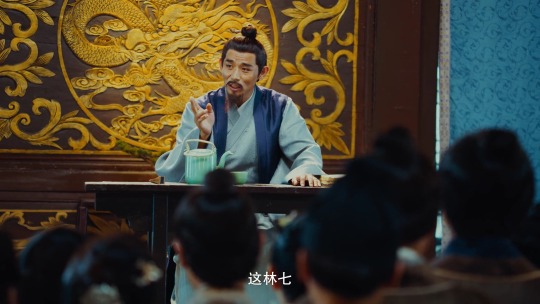
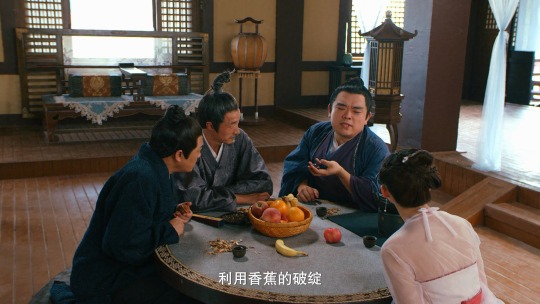
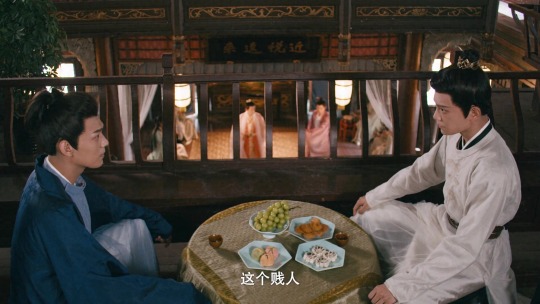
but beyond all that, the drama is just so much fun fun funnnnn!!!! i loveddddd seeing how this drama about a scriptwriter getting stuck in her own script had scenes interspersed with storytellers on the street retelling qianqian’s exploits and qianqian’s regular meetups with the storytellers/opera writers to discuss how the plot of the drama was going or even the scene where hanshuo and peiheng went to the opera house for their male lead showdown and the opera characters were there saying all the rude things they wanted to say to each other. such fun meta?? breaking the fourth wall?? satire?? idek LOL i just know i enjoyed it thoroughly
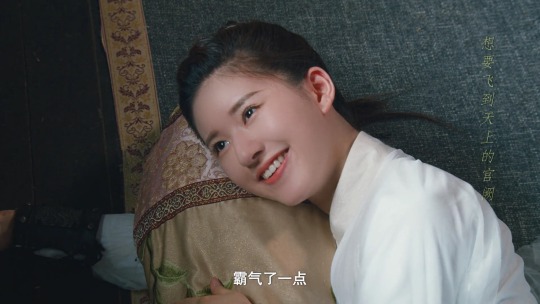
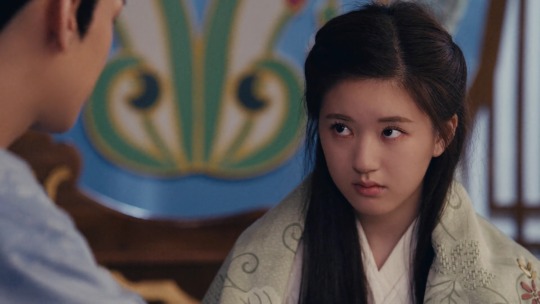
and lastly, apart from all the thinky thinky stuff, i’m thoroughly charmed by the otp HAHA. i loveeeee qianqian so much and zhao lusi is soo effortlessly adorable and natural and charming in this role that i can totally see why everyone from han shuo to her mother is enamoured by her. i actually am really curious also to see how qianqian before xiaoqian transmigrated into her body was like - seeing how her servant didn’t seem to have any whiplash from an extreme change in personality suggest that maybe qianqian wasn’t all that different from xiaoqian?? and probably might not have been that spoilt/callous/havoc-wreaking as everyone perceives her to be?
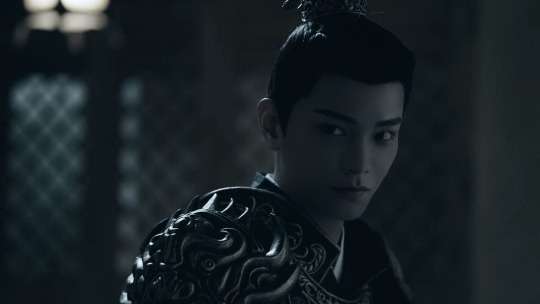
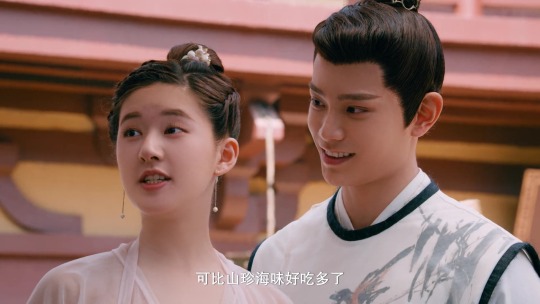
and han shuo too is SO entertaining and funny and darling - when he first came to huayuan city he’s all “i’m cunning and smart and i’m going to MANIPULATE EVERYBODY for my/xuan hu city’s benefit�� and “i want chen qianqian to die with ten thousand arrows through her heart!! i want her to be stabbed by knives three thousand times!! not a single time less!!!” and “do you think i don’t dare to kill you?!”. then he falls in love with her and instantly he’s all puppy eyes and utter devotion. IT’S DELICIOUS. ding yuxi really makes staring at your FL like she’s the only one in the world an art form. and as one comment on a bilibili mv said regarding han shuo’s supposed bloodlust, “han shuo, up to this point you’ve only killed one horse” HAHA
(keep in mind that it’s not even that han shuo ordered the killing of this horse, it was his subordinate that killed it on his behalf, and han shuo was Not Happy about it after that!)
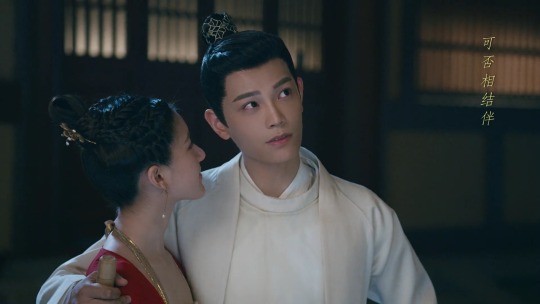
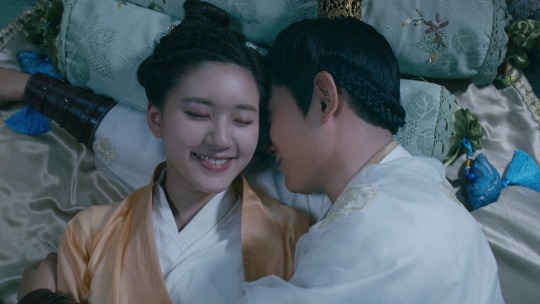
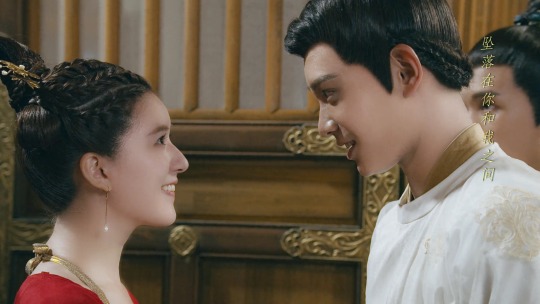
together the otp are even more adorable!!! it’s teeth rotting fluff but yet it comes off very earnest and adorable without being cloying. i was literally clutching my heart and grinning at the screen dopily at some scenes. and even though the otp dynamic and character setups are not really the same, the way the two of them bicker and act like children around each other kind of remind me of yongqi and xiaoyanzi from hzgg for some reason lol.
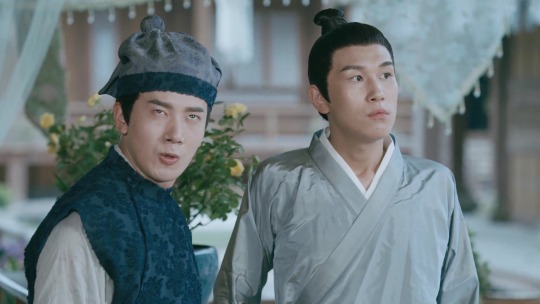
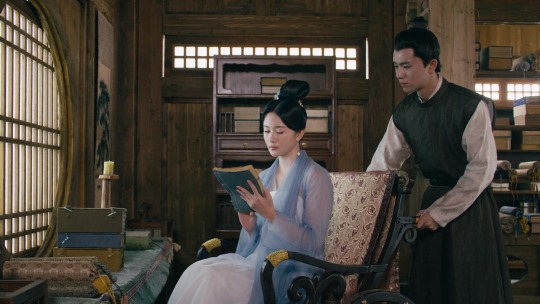
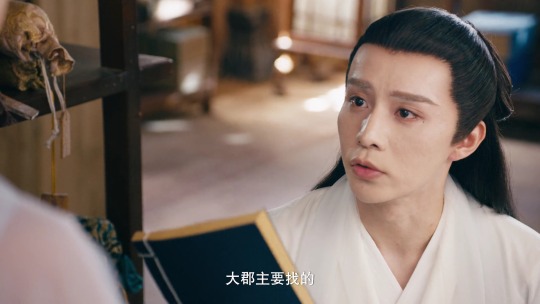
and apart from the otp, there are a whole host of supporting characters that are really very funny and adorable and entertaining to watch haha. special shoutout to both han shuo and qianqian’s subordinates who are HILARIOUS and plain Done with their masters’ nonsense (especially bai ji who really just wants to get shit done okay!! but his master just keeps on wanting to fall in love and date!!) there’s also qianqian’s older sister yuanyuan who is disabled and on a wheelchair, and with a sad yet somehow hilarious penchant for writing multiple drafts of her will. and her otp, su mu, a courtesan (yes the courtesans in this city are all male).
honestly i’m not sure where i’m going with this, i just briefly scanned through what i’ve written so far and lol seems like paragraphs of illogical incoherent rambling. I’m sorry it’s 5am over here i’m not really thinking straight T_T i just have a lot of feels for this drama okay ;_____;
#the romance of tiger and rose#传闻中的陈芊芊#cdramanet#zhao lusi#ding yuxi#赵露思#丁禹兮#mine#drama watching#count the number of times i said the word funny... where has all my vocabulary gone lol
321 notes
·
View notes
Text
Brick Club 1.3.4 “Tholomyes Is So Happy, He Sings A Spanish Song”
I think this chapter title is actually yet another pun. In a later chapter, Favourite mentions that Tholomyes’ first name is Felix, which is Latin for “happy.”
This first paragraph feels like a pretty blatant comparison of the group to the nature mentioned. The flower beds are balmy with perfume, as the ladies may have been, the boughs are gesticulating as the men (and maybe the women) were, the bees pillaging the jasmine is certainly a pretty obvious metaphor, the “bohemian crew of butterflies” would probably be the men, landing briefly on these women for a year or so and then taking flight elsewhere.
(I just looked up bindweed and flashed back to elementary school, where it grew as a weed all over the campus and we’d pick it and put it to our noses and inhale so the petals stuck to our faces, so now I’m imagining them doing that.)
The fact that everyone but Fantine is kissing everyone else is yet another clue that she doesn’t exactly fit in. It also seems like another indication that Favourite should have been paired with Tholomyes.
Fantine’s “dreamy, fierce resistance” (FMA) or “dreaminess and wildness” (Hapgood) is an aspect about her that I feel comes out a little more when she’s back in Montreuil-sur-Mer and has unfortunately hardened a bit. She has quite literally no lines of dialogue until 1.3.8, and her lines up through the letter are superficial, except perhaps for the line about the stagecoaches. Everything we see of Fantine is observational; she’s watching her friends to follow suit, we’re watching her. Later on, in M-sur-M, she’s fiercer, more willing (or perhaps more desperate) to talk back, to talk aloud to herself. The fierce part of her is very inward here, and it’s poverty and desperation that really brings it out. Her confrontation with Bamatabois later, and the moments just before it, bring the “dreaminess” and the “wildness/fierceness” together quite violently.
(Sidenote: The more I read and think about it, the more I’m loving the Fantine-as-autistic headcanon. She’s quiet here because she’s working hard at masking and mimicking; once she’s at her lowest points in M-sur-M, she’s totally given up that effort because she absolutely does not have the energy or mental capacity. So we then get her talking to herself, self-soothing by wringing her hands, shrinking back, etc etc. Idk who came up with that headcanon or where I read it mentioned, but I love it.)
This entire massive paragraph about love in springtime feels very romantically pastoral in its imagery. It certainly fits with the whole leaving urban Paris to go to the park and nature in Saint Cloud (despite the weirdly dark aspects of the area). He continues the theme by mentioning Honore d’Urfe, a pastoral romance author, and Watteau and Lancret, both painters of light, colorful, Baroque style paintings. Watteau painted “The Embarkation for Cythera,” a painting of a fete galante, which is essentially what’s going on in this scene. Cythera is the Greek island said to house a cult of Aphrodite. I’m not sure what the Diderot reference is doing there; I know about his reason vs feeling philosophy, and I know he wrote a “naughty” novel, but I’m not sure how either of those fit into these themes in the rest of the paragraph?
"Beautiful girls lavish their charms with sweet prodigality. We imagine it will never end.” What an interesting pairing of sentences. The second line takes on a tone of quite dark foreshadowing when reading the Brick again. But that first line is interesting to me for the idea of women wasting their charms on men. It feels like an expansion of his “poverty and coquetry are fatal counselors” line, but from a different angle. Flirting or falling in love with a man who is only going to use you for his own pleasure and then drop you is a waste of emotion, not to mention painful if you’re not ready for it. Lavishing “charms” on men only for them to treat a woman in a way that could potentially ruin her is Bad. But if you don’t realize that’s what’s happening, if you think that instead of shallowness or emotional manipulation, you’re actually getting real love and connection, you’re not going to ever want it to end. And then when it does that shock and hurt is so much the worse. Again it’s the difference between Fantine and the others; she seems to think it’s real love on Tholomyes’ side like it is for her, while everyone else seems fairly aware that it’s just a fun little fling and nothing more.
Riding donkeys seems like kind of a ripoff in terms of a date? Maybe another example of Tholomyes’ cheapness as a date as well as an example of his charisma. If he can sell riding an ass as a fun and cute outing instead of a bit of a let down, then no wonder he’s the one in control of this whole endeavor.
I have no idea what plant it is they’re viewing at the Jardins des Plantes, and it’s really bothering me. The only thing I could think of is wisteria, but that can’t be right, since it has leaves, and I have no idea how to search that on google. I’m also wondering what the “mannikin anchorite” at the Chateau d’Issy was. There’s a statue of the actual St. Cloud (Clodoald) in Saint Cloud, but they’re in Issy at this point as far as I can tell, so I have no idea.
As far as I can tell, the satyr-millionaire/Turcaret-Priapus lines are just a joke about rich horny people. I’m not sure why the hall of mirrors is an aphrodisiac? But I suppose the joke is something about voyeurism and watching the person you’re attracted to via means only available to those with lots of money to build a hall of many mirrors? Unless I’m interpreting the entire “cabinet of mirrors” wrong and it’s not even real mirrors. I’m just making guesses at this point.
I think the “Abbe de Bernis” line is a reference to Casanova, but I’m not 100% sure.
Fantine refuses to swing, and Favourite thinks she’s being superior. This seems like another moment pointing out Fantine’s modesty; the “flying skirts” produced by the swinging are maybe a little much for her taste. But it’s another thing that makes me think that maybe the other girls don’t like her very much and are maybe a little frustrated at her prudish behavior compared to the others, or think that that modesty is her thinking she’s better than them.
They’ve now been out and about for about 10 hours, which is a lot. There’s a post somewhere on tumblr about the Russian Mountains, but I love that there was a rollercoaster in Paris in the 1810s. The roller coaster also seems like perhaps an interesting chance at a metaphor for what’s coming: a big climb upward, a rush, and then suddenly much lower than you were a moment ago. For the other women, being back down on the ground is expected at the end of the ride, but for Fantine, it’s an unexpected, painful let down.
Ten (or more) hours is a long time to wait for this “surprise.” I’m wondering if this whole outing has a sort of twofold objective: one as a sort of “last hurrah” date, where they do all the fun things and then there’s the cruel “surprise” at the end. And two, as a way to tire everybody out, so the women would do exactly what they do later on in 1.3.9: get distracted with chatting or just gazing out the window in thought until they suddenly realize how much time has passed, giving the men plenty of time to get away.
#les miserables#les miserables meta#brickclub#lm 1.3.4#les mis#les mis meta#oops i was accidentally 2 days early with this one#got my chapter chunks confused
51 notes
·
View notes
Text
Manga vs Anime: Episode 30 “Bad Sign”
So let’s start with Ep 6 of the 3rd series… which is the 30 Golden Kamuy animated episode.
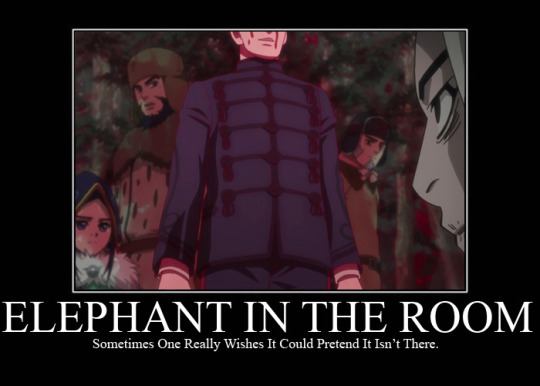
Some data first.
This episode last 23:40 minutes and has an opening and an the ending. It covers 3 chaps and a half of the manga, chap 163, 164, 165, & half of chap 166 for a total of around 69 pages (I’m discounting the covers) basically covering half of Vol 17.
The episode is titled ‘Bad sign’, which is actually the title of chap 164, chap 163 being ‘Wanted poster’, chap 165 being ‘Flag bearer’, and chap 166 being ‘Request’.
NB: I’ve noticed the subs in this episode diverged in some points quite a bit from scanlations and official translation (like Yuusaku saying he was avoided by others in the barraks when it was more that OGATA was avoiding him or similar things). Japanese is often vague enough to allow for both meaning even if one is more obvious than the other to who knows the plot. I didn’t cover them in this analysis as I focused only on the animation and voice acting but consider yourself warned.
And now into the anime.
ASIRPA’S GROUP
Manga & Anime: Asirpa checks the wanted poster Ilya had, which matches with Kiro. Kiro tells her of his involvement in the facts of Saint Petersburg and of how Wilk was involved as well.
There are just some minor differences:
- In the manga we see Ilya throwing up blood before dying, while in the anime this scene is cut, possibly because they showed Ilya throwing up blood previously.

- In the anime, after Shiraishi says the guards were after Kiro, we see an image of a clearly dead Ilya. This wasn’t in the manga.

- In the manga Shiraishi comments how it’s not surprising the Russians are angry. In the anime this is cut.
My two cents: I’ll say this bit is well done. Not only the images are faithful enough to the manga but the way they’re presented gives the scene the right rhythm and atmosphere. The colouring, which gives in the idea of a flashback, is a nice touch and is also nice to watch and the final panning on the statue is a good idea. The background too is very nice. If anything the only thing is that apart from Kiro and Wilk people are absolutely still and will remain absolutely still. I get animating them would take more work but they really feel like dolls. On a positive side I loved how they handled Asirpa discovering Wilk was involved. The revealing of Wilk face alternated with Asirpa seeing the poster,

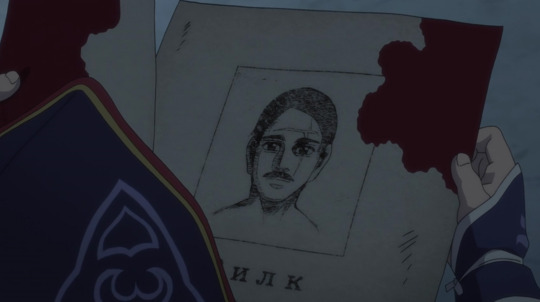

the rhythm of the scene, the music… well it was very good… and since they didn’t want to animate the people around them I think it was a clever trick to show all that smoke around Kiro as he carried away Wilk so as to cover the other people and make unnecessary to draw them. The panning on the statue was also a nice touch.

Oh, since the anime had sunset happen in the previous episode now the characters are shown with the colours implying it’s night. To be honest I should praise their eyesight as it seems pretty dark but I guess it was clear enough to allow Asirpa to see the poster.
THE OPENING STARTS HERE
VASILY KEEPING WATCH
Manga & Anime: It’s night. Vasily keeps on observing who he thinks to be Ogata but can’t catch him moving or breathing. Plus his hiding spot is bad as he could easily be seen, which isn’t a mistake he believes a veteran sniper like the one who killed Ilya would make so he decides to keep on observing.
My two cents: The anime well transposed this scene in animation. Not only it’s faithful to the manga but it gets you in the right tension.
KIRO’S GROUP IS WAITING
Manga & Anime: Kiro’s group is waiting for Ogata. Shiraishi, holding what was likely Ilya’s Mosin-Nagant, comments Ogata is late and wonders if they should go to back him up. Kiro says since Ogata told them to let him do it on his own they should just believe in him and wait.
My two cents: This is also well transposed. As Kiro’s talk was long they even redrew him in a different position and even had him move. Well done!
PREPARATIONS FOR THE HUNT
Manga & Anime: Vasily keeps on studying his opponent. Sunset comes and Vasily notices tracks near the body of his adversary. He follows them and see they lead to an Orok casket. He then assumes this means what he had been observing is just a scarecrow made using a corpse and Ogata is actually hidden in the casket therefore he shoots at it, the noise waking up Asirpa’s group. Only it turns out he was wrong, Ogata was really under the cape and now it’s his turn to shoot. He hits Vasily’s jaw, causing him to fall on the ground then tries to move but fall on the ground, panting.
There are just some minor differences:
- In the manga there’s an explanation about the battle of two snipers during the battle of Gallipoli. This is cut in the anime.
- In the manga Vasily shoots 6 times at the casket, in the anime only one.
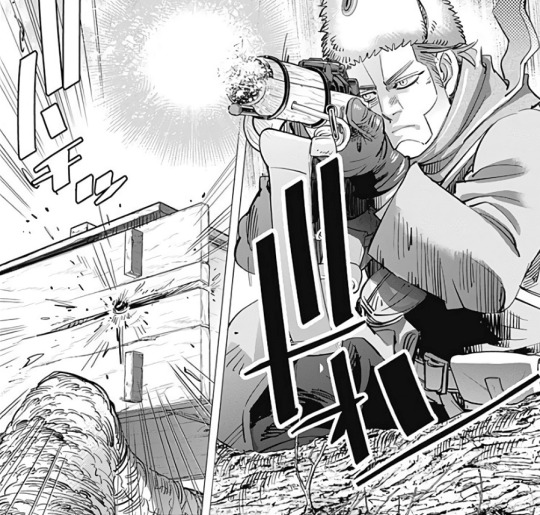


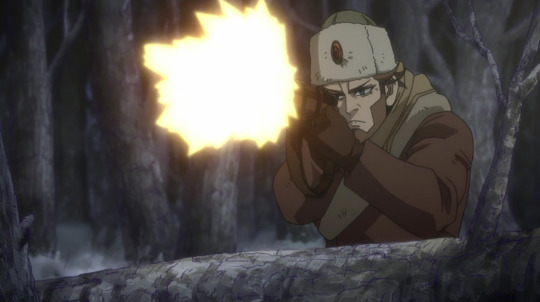

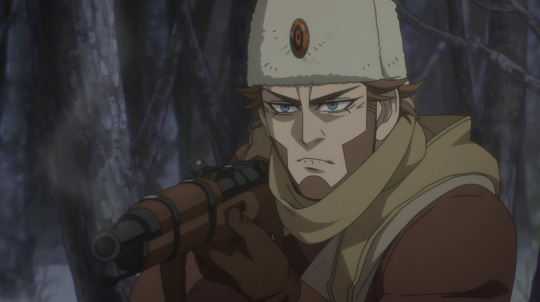

My two cents: I would have said this is a beautiful transposition as not only it’s faithful (actually cutting the explanation allow the tension to rise more) but it pays good attention to the characters’ expressions and to the rhythm of the scene. Ogata moving slowly and then the shoot hitting Vasily is great as a choice,

the bullet hit Vasily in a scene that delivers what had happened without being too gory and even the splatter of blood work.
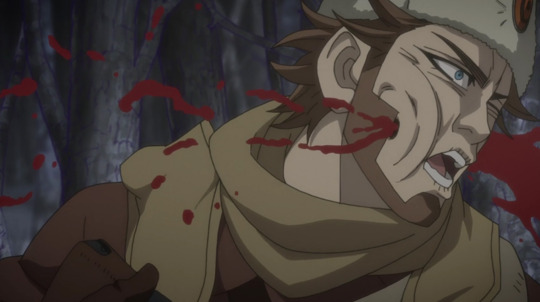
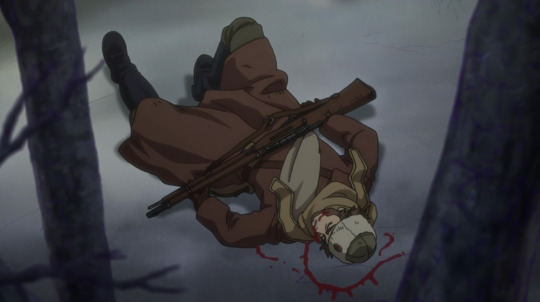
Ogata’s colouring hints at how he’s already feeling ill, well combined with the way he breathes.
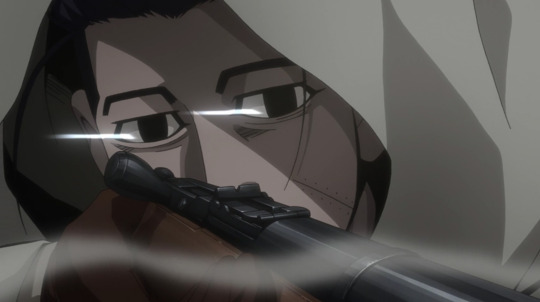
They even darkened his eyes to make them more faithful to the manga
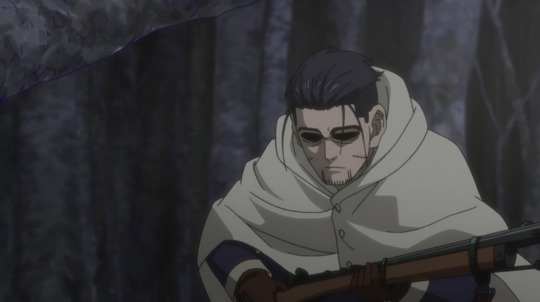
and his fall as well as the way he pants are also well done
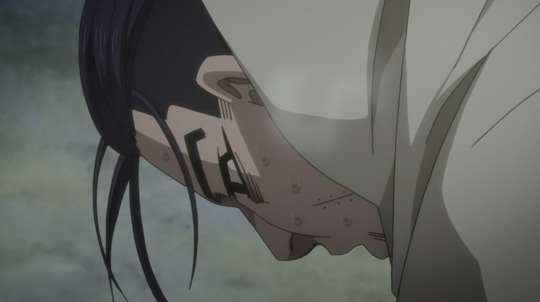
so it would be a great scene if it wasn’t for an AWFUL mistake. Vasily didn’t shoot just one time to the casket, he shoot 6. The whole point wasn’t just to make him shoot first, but to make him shoot all his bullets so that Ogata, who only had a single shoot rifle could use that at his advantage. I really, really hope they’ll add the sound of those 5 more shoots in the dvd version because this is a pretty bad logical mistake. On a positive side this time, differently from the previous episode, you can see the traces in the snow and the colouring is very nice.
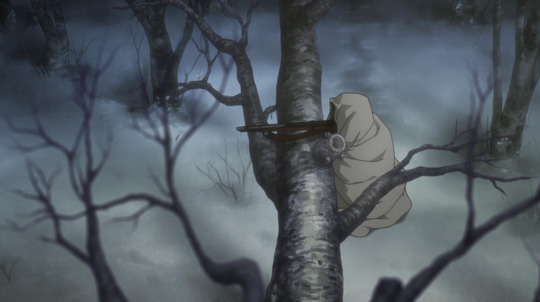
CHAP 163 ENDS HERE.
BACK TOGETHER
Manga & Anime: Asirpa notices Ogata is back to where the Orok/Uilta are waiting so they reach him to discover he looks really pale and has a fever. Ogata tries to wave him out as him merely eating too much snow when, looking at them, he hallucinates Yuusaku.
There are just some minor differences:
- In the manga Kiro says it looks like everything had been taken care of. In the anime this line is cut.
- In the manga Shiraishi crouches down to look at Ogata when he says Ogata looks really pale, his expression surprised and a little worried. In the anime he’s standing and looking normal.


- In the manga Asirpa isn’t in the panel when Ogata sees Yuusaku, even though she was standing right in front of him. In the anime she’s present.


My two cents: While the previous scene was good this one isn’t that great for various reasons. Shiraishi doesn’t sound really like he cares here, while in the anime he seemed to do so. While Tsuda Ken well deliver Ogata is not feeling well, the anime had Ogata raise his eyes before he finished speaking. It can work in the manga, where time works differently but in the anime we’ve the impression for 5 second he wasn’t seeing anything abnormal then BANG he hallucinated Yuusaku, combined with ghost sounding effect. The ghost yuusaku effect is nice but the worst thing the anime does which will be a mistake through the whole of it is that they add Asirpa to the scene when Ogata was instead hallucinating that Asirpa was Yuusaku (in fact even though she was standing right in front of Ogata till a moment before as soon as Yuusaku appear she suddently disappear and only Kiro and Shiraishi remain), something that in the manga ties well with the ending of Ogata’s fever dream but that doesn’t do so in the anime.
HALLUCINATION
Manga & Anime: Ogata hallucinates being on a sled trained by ghostly reindeers, Yuusaku leading it, turning to him and asking him if he feels cold. This causes Ogata to remember of the time when Yuusaku was alive and they went to visit a brothel together. Once he suggested Yuusaku were to have fun with the women there, Yuusaku refused, apologizing and Ogata let him go, making sure he wasn’t seen by others.
There are just some minor differences:
- In the manga, when Ogata asks Yuusaku to come with him, Yuusaku blushes. In the anime he doesn’t.

- The anime adds a scene in which one of the women caresses Yuusaku’s hand.

- In the manga Yuusaku sweats before answering to Ogata. In the anime he doesn’t.

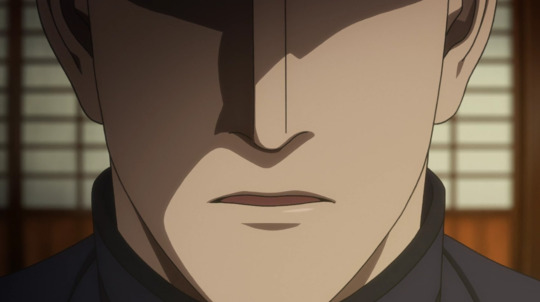
My two cents: Okay so I liked the run on the ghostly sled, with that odd red colouring which I think was inspired by the cover for vol 17.


Even the idea of Yuusaku’s blood spraying all around is somewhat well done in it’s creepiness.
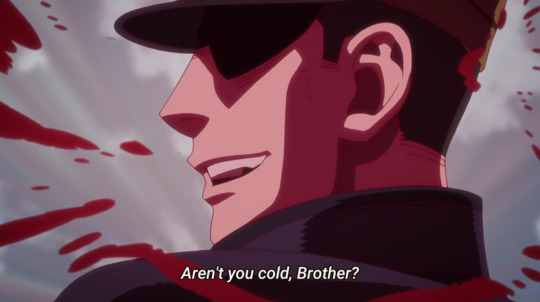
The transition to the flashback is well done with the camera moving on Ogata’s eye which close and open and then we see Yuusaku in the flashback.
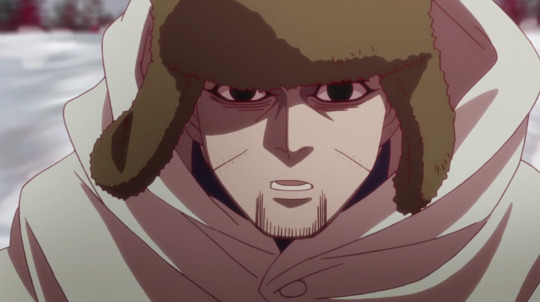
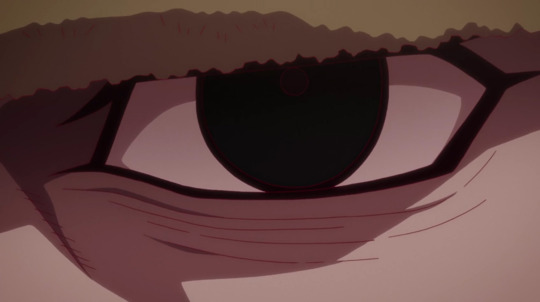


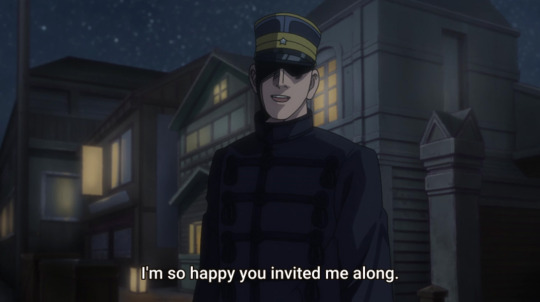
Yuusaku’s voice is always very kind and the music, while not great, well underlines the mood of the scene. I like the choice to make a beautiful very starry sky, which seems to imply hope. Yuusaku doesn’t blush but his joy at having been invited is evident. The scene at the brothel sets up the atmosphere perfectly, with Yuusaku greatly uncomfortable as Ogata goes on. The first clenching, the lips trembling, the exhaling, everything is perfect.
THE OROK/UILTA CAMP
Manga and anime: Kiro’s group reaches an Orok/Uilta camp of a relative of the men that were with them. Asirpa helps Ogata getting down from the sled while Shiraishi observes. Once inside the tent she uses Ainu remedies to try to get Ogata feel better. An Orok/Uilta shaman also joins them trying with his music, to chase away the illness, with Asirpa and Shiraishi helping to make the healing music.
There are minor cuts and changes:
- The anime expanded the scene in which Asirpa helps Ogata, adding Ogata almost falling then slowly walking toward the tent, supported by Asirpa.
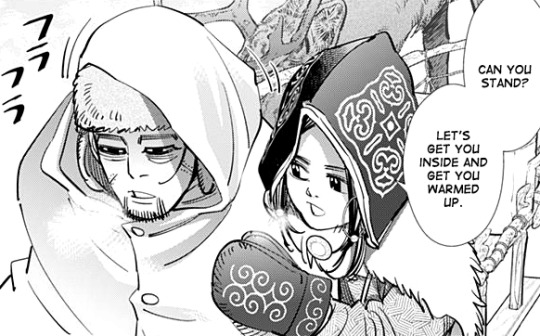


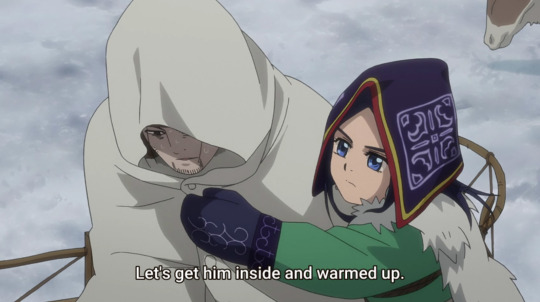
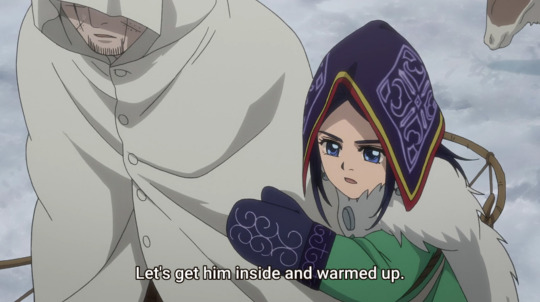
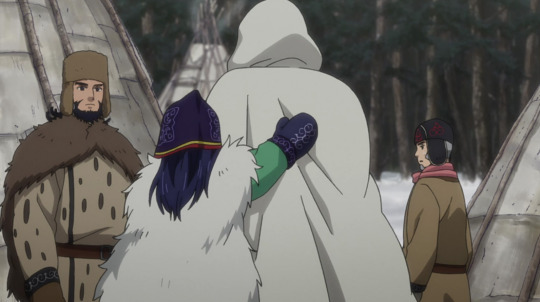
- In the manga Shiraishi merely observes the scene, his face shadowed, sweating a little. In the anime he also lowers his head and turns away his gaze, as if torn.
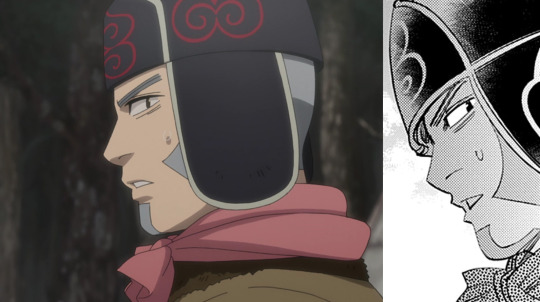
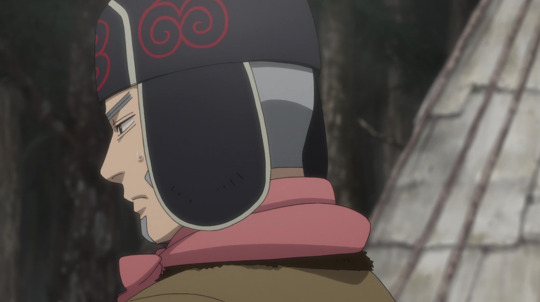
- The anime added an image showing Shiraishi and Asirpa listening to Kiro’s explanation.
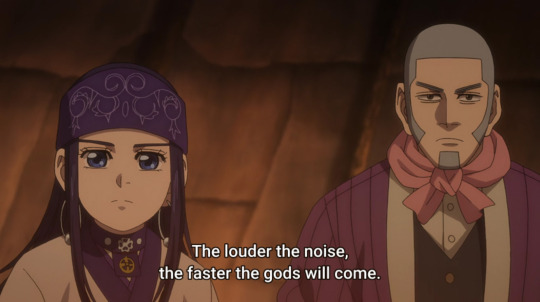
- In the manga we see an image of Ogata sweating and, next to him, Yuusaku. In the anime we see Ogata sweating and then, among the steam, appears an image of Yuusaku all curled up, and then Ogata’s eyes.
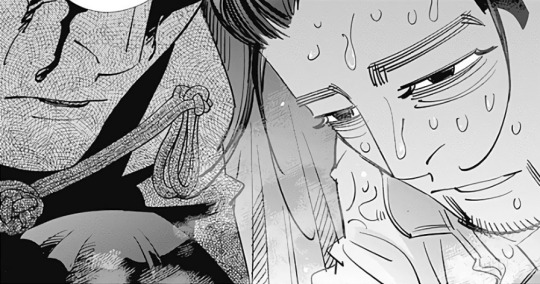
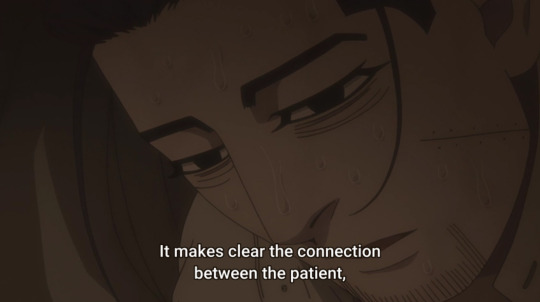


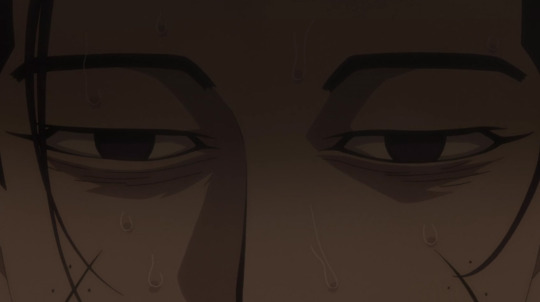
My two cents: The scene of Ogata having troubles standing is well handled, they almost had him fall and then walk really slowly which is perfect. I also like how they delivered Shiraishi’s inner turmoil. It’s also good how they transitioned from Shiraishi and Asirpa listening to Kiro to them making noise as loud as they could. Sure, the scene of Ogata saying ‘silence’ is a bit less funny as Tsuda Ken delivers it in a sick yet creepy way but it works well. I’ll even go so far as saying that the way the anime chose to make Yuusaku appear during the music scene is better than the one of the manga.
THE SECOND HALLUCINATION/FLASHBACK
Manga and Anime: We’re back at the brothel, with Ogata sitting alone with one of the girls when he’s reached by Tsurumi. At this he sends the girl away and makes his best to look proper. Tsurumi comments the rumours on Yuusaku’s personality seem to be true, Ogata counters he was probably frightened by the atmosphere and insists he can manage to deceive him. Tsurumi says if he has a strong sense of justice it would be difficult to get him on their side, after all Yuusaku comes from a noble bloodline, which pushes Ogata to reject the notion of ‘noble blood’.
There are minor cuts and changes:
- In the manga Ogata’s face is deeply shadowed when Tsurumi says Yuusaku has noble blood. In the anime it’s not but they add Ogata’s eyes widening and then lowering.


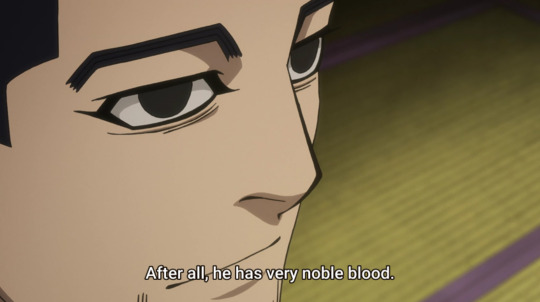
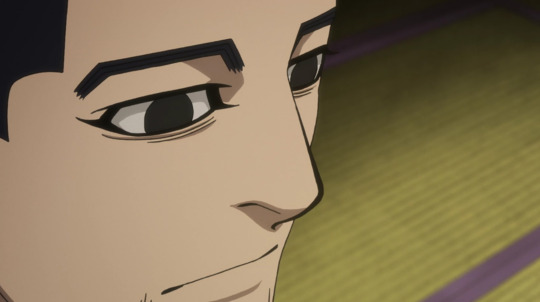
- In the manga the shading on Ogata hinted at how he was in an emotional turmoil. No such hint there’s in the anime.

My two cents: This too is well done. I must praise Tsurumi’s voice actor because he’s great in delivering his quotes and we own to him most of the success of the scene but a good moment is also when the anime had Ogata’s eyes widen slightly at the mention of noble blood, showing how Tsurumi hit the mark and then lowering, showing how that remark hurt. Good is also the pause before Ogata delivers his quote.
THE ANIME PLACES HERE AN EYECATCH
SHIRAISHI, ASIRPA AND KIRO’S TALK
Manga and anime: Shiraishi leaves the place with an excuse and manages to lead Asirpa to follow him. Once she reaches him he tell her to escape with him. He believes Kiro took them there to try to get Asirpa to remember the key and that’s why Shiraishi kept silent but now he believes it’s too dangerous to stay in Russia. Shiraishi explains her his reasoning but Asirpa insists she’s staying. Kiro joins them, explaining them his old name was ‘Yulbars’, which was his past and why they killed the emperor. They’re fighting for minorities which includes his son and the Hokkaido Ainu. Asirpa says she wants to know more about her father and that she might remember the code then wonders if the killing to get the gold will continue with an even bigger killing once the gold is found and wonders if the gold really need to be found.
There are minor cuts and changes:
- In the manga isn’t clear if they are or not but the anime showed how Shiraishi and Asirpa were still making noise, albeit more calmly.

- In the manga Shiraishi points out to how there should be someone watching them as Kiro killed the emperor 20 years ago yet the Russians were right there to wait for them and that the Orok/Uilta man had almost be killed. Plus he mentions how when in the past they asked Kiro what Wilk might want to do with the gold, Kiro said he didn’t know but it was a lie as he had to know Wilk wanted to use the gold to fight against Russia. Kiro had to know as they killed the emperor together so it’s possible Kiro’s aim is the same, which was what Inkarmat was saying. In the anime he says one Kiro is hiding things from them as he and Wilk were trying to steal the gold to fight Russia.
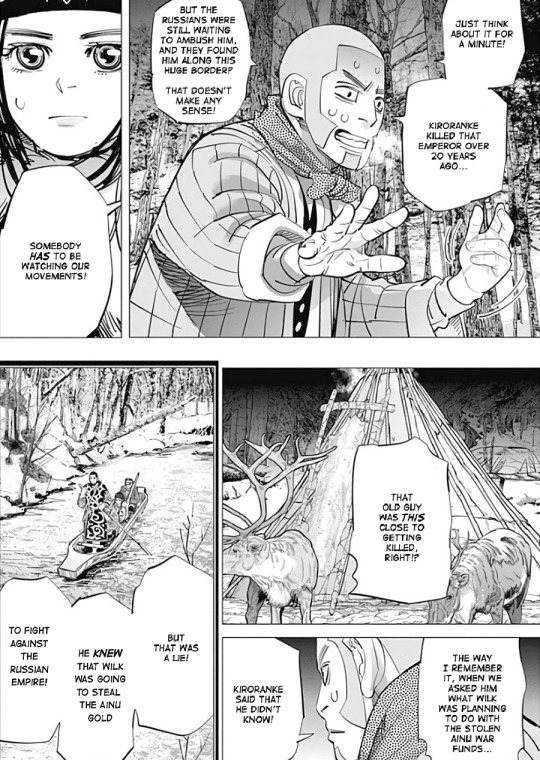

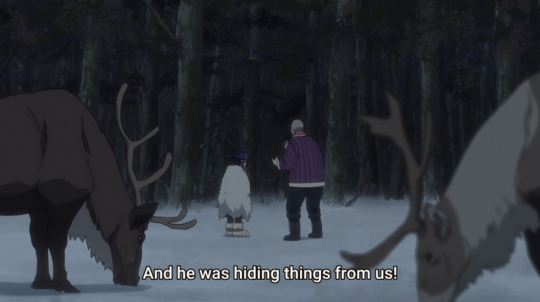
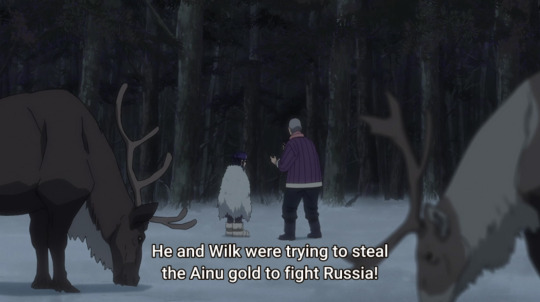
My two cents: I liked how they remarked Asirpa and Shiraishi were still playing for Ogata... not so much how Shiraishi’s entire reasoning got cut but I get the anime needed to cut here and there to save time. I also like the transition in which everything turns to blood which rises toward Sugimoto’s image as well. I was curious how the anime would have handled this and I’ve to say they did it really well.
CHAP 160 ENDS HERE.
BATTLEGROUNDS
Manga and anime: Russo-Japanese war. Yuusaku, holding the flag, encourages men to march forward. Later Ogata is alone shooting Russians who wanders on the now empty battlefield. Tsurumi approaches him telling him Yuusaku is brave and everyone loves him. Ogata summarizes he doesn’t have to kill him.
There are minor cuts and changes:
- In the manga the two panels showing Ogata during the battle show him aiming. In the anime only the second does and between the two there’s an image of Yuusaku.


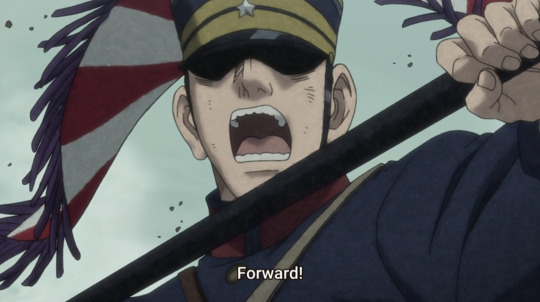
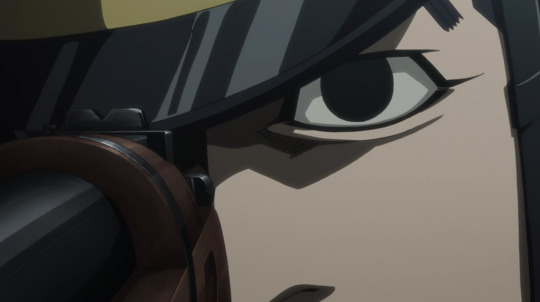
- In the manga we see Ogata shooting then a Russian falling, Ogata recharging, then another Russian falling then Ogata recharging. In the anime we see a Russian falling, Ogata shooting, another Russian falling, Ogata recharging.
My two cents: The transition here is a tad abrupt. I’ll admit the anime managed to deliver the general madness of the war, with soldiers drunk on the belief they won’t get hit due to Yuusaku. Sure, I would have appreciated less still scenes during the battle but whatever, at this point I guess the anime thinks they’re cool. The transition from the battle to the empty battleground work well and the dialogue between Ogata and Tsurumi is well done. I’ve to admit I like very much the contrast between Tsurumi’s voice and Ogata’s but it might be just me.
AT THE OROK/UILTA CAMP
Manga & Anime: Ogata is sleeping, Asirpa cheeks his forehead and comments his fever has gone down. As Kiro thanks the shaman Asirpa is gifted with a protective charm for Ogata. They give a protective charm to Shiraishi too, for a child’s penis.
There are minor cuts and changes:
- In the manga a box explains what the headband is for. In the anime it’s Asirpa who does so, saying it seems to work.
- In the manga the protective charms are shown in a box. In the anime the shaman shows them.
- In the manga Kiro says that they’re going to give that charm to Shiraishi because he was staring at a woman’s breast while she was feeding a baby. In the anime this is cut.

My two cents: Not bad. They’ve to adapt some things as they decided not to use the narrator but I’ll say it works just fine.
THE LAST FEVER DREAM
Manga & Anime: It’s night and Ogata and Yuusaku are walking on the now empty battleground, ogata leading Yuusaku somewhere. Yuusaku worries they’ll get scolded if they’re discovered. Ogata shows him a prisoner of war completely tied, then points out since he got there Yuusaku had never killed anyone and wonders if he’s using his role so as not to get his hands dirty. At Yuusaku’s denial asks him to kill that man and Yuusaku explains him his father told him not to kill so he would become an icon that would give them courage because killing fills others with guilt. Ogata says nobody feels guilt, they’re merely faking it, everyone doesn’t and is the same as him. Yuusaku hugs him and, crying, tell him he’s sure Ogata feels guilt as it’s impossible for people who not feel guilty when killing to exist.
There are minor cuts and changes:
- In the manga Ogata’s face is shadowed as he asks Yuusaku if he had ever killed someone with a darker shadow falling on his eyes. In the anime it’s not.
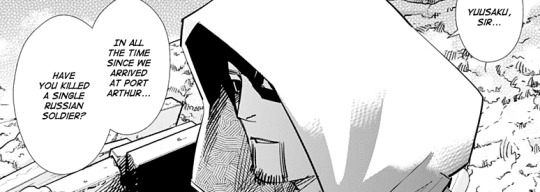
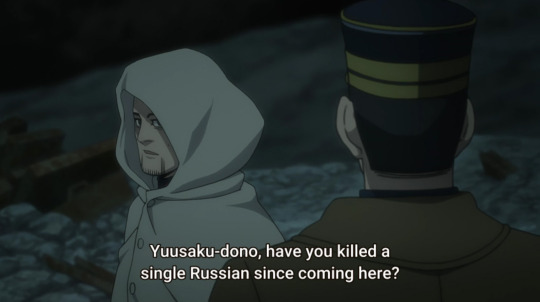
My two cents: This too is a good transposition. It’s faithful to the manga, it well used the corpses around them to make atmosphere, the voice actors generated a nice contrast between Yuusaku being so emotional and Ogata so calm and flat… yet as if he had something bubbling under the surface. If I’ve to nitpick I can say I’m a bit annoyed at the anime using a still image again when showing Yuusaku in ‘action’ and that Yuusaku hugged Ogata a tad too slowly so it felt a bit odd. Also the background music is nice and fitting but it would probably work better if it was on a higher volume as otherwise it can go unnoticed. Still, this is good.
THE END OF THE FEVER DREAM
Manga: At the next charge Yuusaku gets shoot from behind, the implication being Ogata did it. Yuusaku falls. However he’s then standing again and turning toward Ogata. Only it’s actually Asirpa as Ogata has woken up from his fever dream.


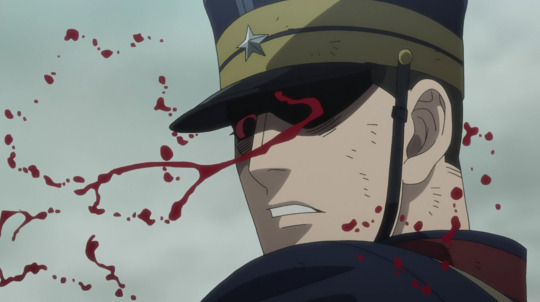


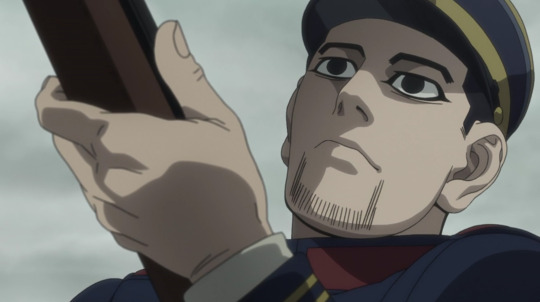
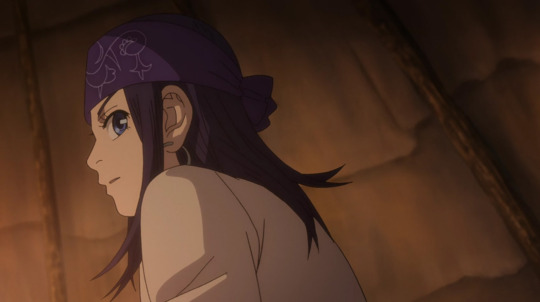
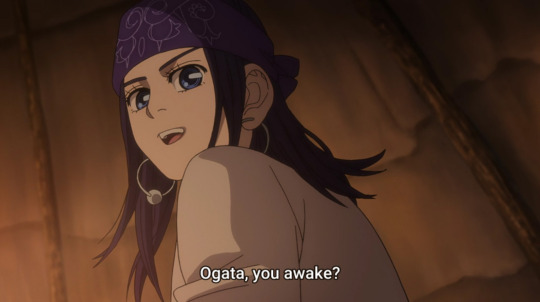

Anime: At the next charge Yuusaku gets shoot from behind, the implication being Ogata did it. Yuusaku falls. However he’s then standing again and turning toward Ogata. Ogata wakes up and Asirpa turns toward him.
My two cents: And this is where the anime screwed up BIG TIME. The whole implication of the scene wasn’t that Yuusaku, despite the bullet going through his head and the fact he had fallen stood up again to turn and look at Ogata… it was that as Ogata was about to wake up he saw Asirpa turning toward him but at first he exchanged her for Yuusaku turning toward him. How anime viewers are going to understand Ogata’s meltdown on the ice if they aren’t told Ogata has subconsciously superimposed Yuusaku and Asirpa’s images? I could give the anime a pass for not figuring it when Ogata started hallucinating Yuusaku, as that one wasn’t that easy but this wasn’t so damn hard to get, the page with Ogata and Yuusaku and the page with Ogata and Asirpa are drawn so similar exactly because you have to get this point! Really, if it wasn’t for this single one mistake this episode would be SO GOOD! Why did they have to mess up this? When Asirpa turns and Ogata is staring he doesn’t look like he’s surprised to see her, it looks like he had been frozen there ages ago and isn’t defreezing yet. -_- Well… at least they understood the Yuusaku who turns isn’t real as he starts to have the red tinge of the hallucination. Ogata’s pose as he watches him though is a bit unnatural and if it was made in an attempt to mimic the one he had in the manga, in the manga his pose was hardly visible so it could work while here it feels off.
CHAP 155 ENDS HERE.
FORTUNETELLING
Manga & Anime: The Orok/Uilta divine the fortune for Kiro’s group using the shoulder blade of a reindeer. The result is someone is coming from behind. Shiraishi wonders if this is a good or bad sign and Kiro says it’s good then shows him the shape the crack should have to point out someone is going to die.
There are minor cuts and changes:
- In the manga they showed the various cracks all in a box, in the anime the showed them on the screen one after the other.
- In the manga Asirpa has a doubtful gaze (Asirpa has a long story of not believing in divination), in the anime she’s just serious, then seems to squeeze her eyes a little as if in thinking.



My two cents: It’s nicely done, except maybe for the lack of Asirpa’s disbelief but I fear the ones behind this episode might not remember it (or since they made that horrible prophetic dream at the end of ep 24 they want to retcon Asirpa as believing in this sort of things).
THE TRAVEL RESUME
Manga & Anime: Kiro’s group is ready to leave the Orok/Uilta. Kiro apologizes for the troubles then tells Shiraishi he’ll remain there as yes, staying with Kiro would put him in danger and he doesn’t need to escape from him. Ogata agrees they’ve no reason to stop Shiraishi and Asirpa thanks him for what he did and says goodbye to him. Shiraishi watch them leave, thinking a smart move would be to join Tsurumi but… ultimately ends up running after them as Sugimoto told him he was counting on him to protect Asirpa. Shiraishi joins them saying he thinks in Russia there could be many pretty girls waiting for him and that if penis were to hurt he can use his charm. As he says so the shoulder bone crack further, showing the sign that was meant death of one of them.
There are minor cuts and changes:
- In the manga Kiro looks a bit sad when he says Shiraishi doesn’t have to run away from him. In the anime he’s just serious.

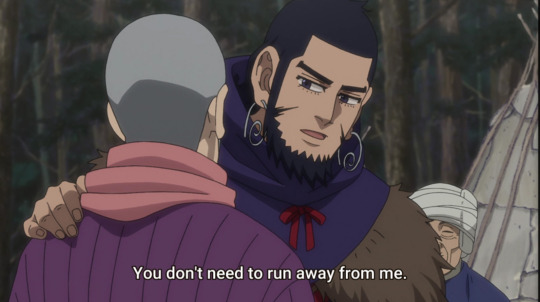
My two cents: I really liked the way Asirpa greeted Shiraishi. Her expression was sweet and her voice actor did a good job. The musical background this time was more noticeable and worked better. They also took care to keep Shiraishi moving and expressive as he explains his plan. Shiraishi running after them is a beautiful moment (too bad the flashbacks aren’t up to the same quality but whatever, they’re from the second series) and Asirpa’s expression and voice as he sees him is beautiful. I like how they showed Kiro smiling too and the way he asked Shiraishi if he changed his mind. The ending with the bone cracking came out powerful so it’s really good.
TO SUM IT ALL
I think this is probably THE BEST GK episode of the 3rd series, if not of all the series. Not only it’s a good transposition of the story, but it’s one that’s not rushed and that uses the times in the right manner, with a good animation and a good care of the character expressions plus a good storytelling and an attempt to use the music that needs to be improved but shows an initial care. Really, a good work. So I really hate how they missed the tie between Asirpa and Yuusaku, which was an important part for the future developments. I could pass over how Vasily didn’t shoot 6 bullets, it’s not clever but whatever, it does no harm if Ogata tempts fate more than necessary or if Vasily is actually more careful than in the original but this.... this wasn’t meant to end here but be tied to the ice field scene and now... not it won’t be, which makes me wonder if the writers are regular readers of GK or just read the bit they need to transpose, and so it’s harder for them to figure out the characters and what they’ll do. Whatever, except for this, it was a good episode, I would love if they were to fix the mistakes in the dvd version though I don’t dare to hope they’ll do it in this case and now I really, really hope the series will manage to keep this standard and, if possible, to improve it.
And also that it won’t completely and utterly screw up the ice field episode. Really. Please, no.
#Golden Kamuy#Ogata Hyakunosuke#Asirpa#Kiroranke#Shiraishi Yoshitake#Hanazawa Yuusaku#Hanazawa Koujirou#Tsurumi Tokushirou#Sugimoto Saichi#Golden Kamuy Manga vs Anime
36 notes
·
View notes
Note
I’ve read Waid and Hickman’s FF runs and am currently reading Zdarsky’s 2 in One. I’m planning on eventually reading the Lee/Kirby run. Can I ask, what other runs would you recommend? Is Claremont’s good? Sorry for bothering.
I LOVE Waid and Hickman’s Fantastic Four runs, and Zdarsky’s Marvel Two-In-One was excellent to the point where one of my lingering disappointments is that Marvel brought the Fantastic Four back in a way that prematurely cut off Zdarksy’s 2n1. I know I said I wanted them back but wow did we all get monkey’s paw’d on that one. Zdarsky did really excellent stuff with both Ben and Johnny and the multiverse hopping was honestly fun and interesting. Lee/Kirby is also, in my opinion, just a really terrific run -- it lays the groundwork for not only the future of the Fantastic Four but a lot of big concepts for the Marvel Universe in general, and I think it holds up really well by modern day storytelling standards. Lee’s sense of humor works well with the retrofuturistic vibe and Kirby’s art is always wonderful. In particular I think it’s interesting to look back on The Galactus Trilogy (Fantastic Four #48-50) as the granddaddy of all event comics, for better or worse.
Claremont -- okay, I love Claremont’s run, let me start off by saying that. Claremont’s run follows on what is in my opinion one of the worst periods of Fantastic Four canon, and I mean bad to the point where the literal canon at that point was that to get things back on track the Fantastic Four had to be put in a bubble universe. Claremont’s run kicks in one or two issues after their return to the main Marvel universe and it’s so fun. I think Fantastic Four is one of those series that kind of flourishes in adversity and Claremont’s run starts off with the Fantastic Four trying to regain their footing in a world that had assumed them dead, their Baxter Building gone, living in a warehouse property. Claremont, in my opinion, also has one of the best if not the best handle on characterization for a lot of key Fantastic Four figures, including Johnny, Reed, and Sue. His Ben is also very good, but I think Ben in particular tends to be an easier sell for a lot of comic book writers -- the outcast, the gruff man, the comic relief. He’s easier to identify with than Reed, the Smartest Man on Earth, or Johnny, defined by his youth and beauty and queercoded since the ‘60s, or Sue, by sheer factor of being a woman. So I think a lot of writers identify with Ben first and foremost and put the most love and care into his depiction, whereas the others are a little easier for them to leave by the wayside. Which isn’t a bad thing -- I love that one of the most beloved comic book characters is also one of Marvel’s few canonically Jewish characters, but there is a wealth of truly excellent Ben canon in comparison to the other three. Especially with Johnny, there’s no one else who has written for Fantastic Four who has put nearly as much thought and detail into Johnny’s relationship with his powers, both the positive and the negative, as Claremont has, even reworking the origin story from Lee and Kirby’s joyous scene of Johnny flaming on for the first time into a deeply traumatizing incident -- being sixteen and traumatized and bursting into uncontrollable flames.
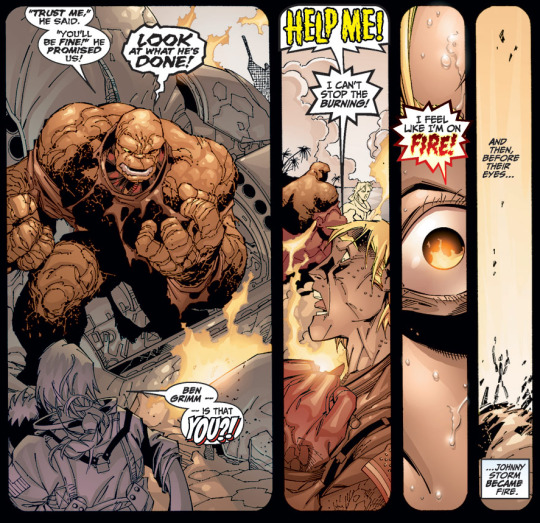
(Fantastic Four v3 #11) There’s also a lot of women in Claremont’s run! A valid criticism of Fantastic Four canon is that by its initial core team makeup it tends to be lacking in female characters compared to some other big Marvel staples, but Claremont brings in a ton, from Reed’s college friend and fellow genius Alyssa Moy (who has been done dirty by pretty much every other writer who’s ever touched her, including Waid and Hickman) to multiversal bounty hunter Bounty to the most platonic of Johnny’s gal pals Caledonia to Valeria Von Doom, a “time dancing” teenage incarnation of the baby Sue lost back in Byrne’s run, who sets up baby Val’s eventual return. Claremont is also king of Reed vs Doom setups -- if you haven’t read his Fantastic Four vs X-Men miniseries, I highly recommend it, and he brings a lot of the two sides of the same coin energy from that into his Fantastic Four run.
The downside of Claremont’s run is that the plot is always there and always running and I could not explain half of it if you paid me. Things certainly happen! Like all the time! For seemingly no apparent reason! Stuff gets set up and then it’s not resolved and now we are in Latveria! I don’t think this is necessarily all that detrimental -- the run is still massively fun and the characterization is always fresh and interesting. It’s just that sometimes you have no idea what’s going on and you have to roll with it. And then sometimes you do know what’s going on but in the way where you know Claremont was just writing it because it’s his kink. Which is like, whatever. As authorial ids go, you can pretty consistently do worse than Claremont’s, I’ll give him that. So I do recommend on it the whole, as long as you’re not going into expecting the kind of plots either Hickman or Waid brought the book. Claremont’s is kind of like “stuff happens and it’s either weird or fun so just don’t pay too much attention to it.”
Aside from Claremont, I feel like I generally like far more Fantastic Four runs than I dislike -- but also I don’t hate Millar’s run, which is honestly bad, so it’s possible I’m just very forgiving with the Fantastic Four. I really like Robinson’s run, which is the last run before the Great Fantastic Four Drought of 2015-2018. It’s short, self-contained, and devoted entirely to one story, so it’s pretty tightly written, with good characterization and some very shiny art by Leonard Kirk. Straczynski’s run is decent enough for the fact that it intersects with Civil War -- I think he does his best to get into the heads of the characters re: their actions in Civil War -- and it leads directly into Dwayne McDuffie’s run, another brief one where Black Panther and Storm take over for Reed and Sue. Very fun. Marvel Knights 4 is also a fairly recent run that’s got some strong moments in it, although I feel it’s a little inconsistent in its handling of the characters. It’s still fun, though. For an older, longer run, I like Simsonson’s -- the art is very dynamic, even if the storyline kind of gets too involved with itself.

(FF #337)
I recommend Byrne’s run with the caveat that there’s plenty to dislike about it and plenty of reasons to avoid it, not the least of it being Byrne himself as a creator and a person. It’s heavily sexist in how it deals with Sue, it retcons a huge age gap into Sue and Reed’s relationship, and Byrne’s early departure sets up my all time least favorite Fantastic Four story. (Though that one is Roger Stern and later Tom DeFalco’s fault.) It is historic as Fantastic Four runs go, though, and there’s a lot in later runs that’s built over it or references it or borrows from it. So it’s a rec with a lot of caveats and I also understand why people might give it a skip -- I think it’s more important for an understanding of the greater body of Fantastic Four canon and the impact it had than for the actual run itself. I do think Byrne has some very interesting subtext with Johnny, although it never come to fruition, and while his Sue falls victim to a lot of sexism, I really like what he does with the character of Frankie Raye, who like poor Alyssa Moy I don’t think has ever gotten really good treatment ever since.
I have mixed feelings on both Millar and Fraction’s runs, not in the least because I think they end very similarly -- and that Millar did it better, which doesn’t say great things. Millar’s run is kind of like a trashy popcorn flick version of Fantastic Four; it’s not actually good, but I can’t say I don’t like the terrible eldritch monster in Scotland Christmas arc (Fantastic Four #564-565) and I’m sort of into future Sue. Fraction, on the other hand, takes a space road trip and makes it boring, which is the greatest Fantastic Four sin of all. He’s one of the rare writers who I think actually writes a bad Ben Grimm -- not the least because his run goes out of its way to try and label it Ben’s own fault that he was transformed into a monster. I do really like his FF (just the initials) though.
The only Fantastic Four runs I can say I really truly dislike are Tom DeFalco’s and Dan Slott’s, which sort of unfortunate because DeFalco’s is both long influential (I have no idea why because it’s honestly terrible like in terms of storytelling) and because Slott’s is happening right now. DeFalco comes onto the book on Fantastic Four #356 and stays on until Fantastic Four #416, at which point Marvel hit a literal retcon button to get out of the mess he’d made. (This leads into Fantastic Four v2, which is largely skippable -- it’s basically a mid-90s retelling of a bunch of early Fantastic Four stories that leads back into the FF heading back to the main universe.) DeFalco’s responsible for the Skrull retcon in the JohnnyAlicia marriage and for dragging that out for over 50 issues, the entirety of which feel like he was writing without a plan or outline or literally anything, and I have never felt like a comic book was attempting to gaslight me through its own incompetence or refusal to commit to things it set up itself as badly as I do with DeFalco’s run. (I like other non-Fantastic Four Tom DeFalco runs. I just hate this one.) Dan Slott’s run is just 25 issues and counting of badly written emotionless unfunny pages blandly stapled together and I so badly want Marvel to kick him off the book for its own good.
37 notes
·
View notes
Photo
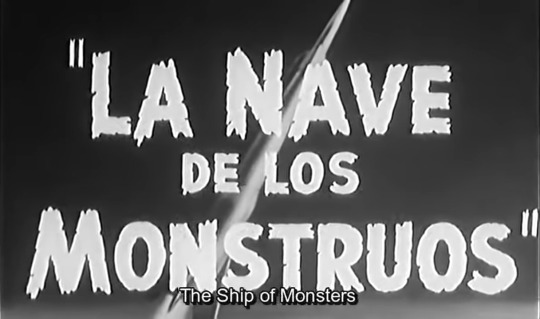
The Ship of Monsters
Check me out, I’m being topical! I had another review almost finished for today, but when I saw the news I knew I had to set that aside and find a movie about life on Venus. This one is a ridiculous Mexican film starring Lorena Velazquez from Samson vs the Vampire Women (looking only slightly less like Cher) and one of those amazing cardboard robots you only get in the very worst of late 50’s and early 60’s sci-fi.
An atomic war on the planet Venus has killed off all the males, so an expedition is sent out in search of replacements, consisting of a native Venusian named Gamma, her Uranian navigator Beta, and their robot Tor. After promising the Empress that they will bring back only the most manly of men, they wander the solar system a while collecting creatures with penises before an engine problem forces them to land on Earth. The first human they meet there is Laureano Gomez, a singing cowboy with a well-earned reputation for telling tall tales. One might assume one could predict the rest of the movie from there… but then Beta turns on Gamma and reveals that her true mission all along was to conquer a planet to feed the vampires of Uranus!
I gotta say… I did not see that coming.

The Ship of Monsters is supposed to be a comedy. It’s seldom funny when it’s trying to be, although it mercifully avoids being the kind of desperately unfunny a lot of bad comedies are… possibly this is because it’s in Spanish, and by the time I’ve realized something is stupid there’s another subtitle to distract me. The jokes, such as they are, are pretty standard. Tor the robot was created by an alien race, who were aware of Earth but never bothered exploring it because they thought the inhabitants weren’t very intelligent. Laureano is in the habit of telling ridiculous stories to his drinking buddies, so of course when he claims the Earth is being invaded by space monsters they don’t believe him. That sort of thing. The movie is much funnier when it’s just showing us absurd situations, but to nobody’s surprise, The Ship of Monsters is at its funniest when it’s trying to be serious.
This hilarity comes in many forms, covering just about all the possible bases for a dirt-cheap 1960 sci-fi film. We have spaceship sets made of cardboard, covered with buttons that don’t actually press and levers conveniently placed so people can bump into them during fight scenes. We have Tor, with his tin can body that’s always a little dinged up but never in the same places, giving us clues as to what order the scenes might have been shot in. He also has wiggly spring antennae and makes a little whirring noise every time he moves. We have space babes in silver bathing suits and glittery high heels. Vampire-Beta, sporting plastic fangs that look like they came from the bottom of a cereal box, could be the female counterpart to the guy from Dracula vs Frankenstein, and the puppet used to represent her in flight is nearly as bad as the one from The Devil Bat.
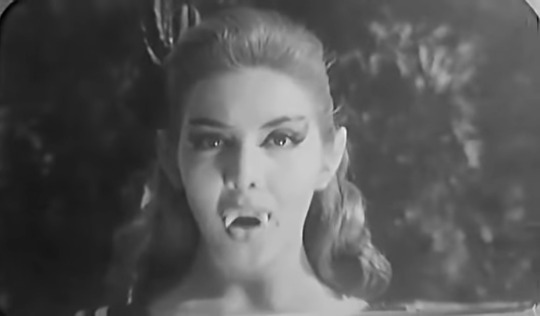
The ‘monsters’ of the title are a bulging-brained Martian prince, a scaly cyclops, a spidery creature with venomous fangs, and the mobile skeleton of what appears to be a *damn worwelf (he tells us that his race has Evolved Beyond Flesh... apparently not Beyond Bones, though). The costumes are all terrible, particularly the warwulf puppet, whose backbone extends into his mouth and who has to be carried around with his feet dangling in any shot that’s not a close-up. It’s nice, though, that a little imagination went into them, and somebody gave a bit of thought to the idea that a monstrous appearance is relative. The Martian tells Beta that he admires her ambition and might even marry her if she weren’t so ugly by his planet’s standards.
At the end, naturally, this alien invasion is defeated by Laureano, his twelve-year-old brother, and a cardboard robot, while Gamma just stands around and screams. With a movie like this I expect nothing less. The denouement contains my favourite intentional joke in the whole thing, in which Gamma stays on Earth with her True Love, and Tor the robot takes his, the Jukebox, back to Venus with him! Tom Servo would have given a speech to congratulate the happy couple, and I can just see him breaking down into happy tears before he got five lines in.
(The wirwalf skeleton is not present at the climactic fight, by the way… no explanation is offered, and I strongly suspect that they broke the puppet trying. I rather enjoy this omission, because it lets me imagine him getting lost or maybe buried by an enterprising dog, and finally finding his way back to the landing site only to learn that they’ve left without him.)
I called Laureano a cowboy but he only has one cow. Her name is Lolobrijida and she is the very first time I have ever seen a movie spur a hero into action by killing his cow. She gets a proper Teenagers from Outer Space death, with her skeleton left behind propped up by metal struts like a dinosaur in a museum!
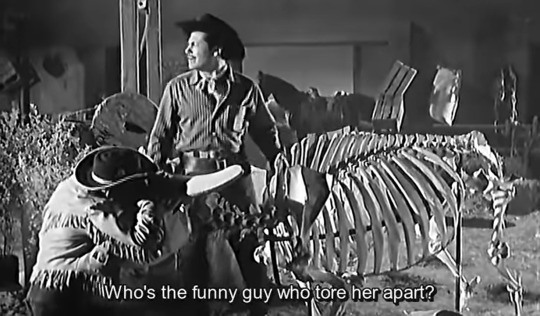
I also called him a singing cowboy, which he is – there are several songs, including one in which he tries to explain to Gamma and Beta what ‘love’ means. The songs have pleasant but forgettable Mexican pop melodies, and none of the lyrics make a whole lot of sense. Being translated over-literally from Spanish probably didn’t do them any favours (my own Spanish tops out at yo no tengo dinero), but I still can’t imagine that the What Is Love song clarified anything.
Laureano himself comes across as kind of a fool, but he’s not actually a full-on idiot, which is quite important. If he were the kind of one-dimensional ‘comedic nitwit’ embodied in characters like Dropo, or the janitor from Reptilicus, he’d be insufferable. Laureano is no genius, but he’s got personality traits besides being stupid – he cares deeply for his little brother Chuy and for his animals, and he doesn’t treat Gamma and Beta’s appearance as two women for the price of one. Very quickly he decides that Gamma is the one he loves, and he sticks to that, doing his best to let Beta down gently even when she offers to make him a king. He’s also smart enough to trick Beta into dancing with him so he can steal the device she uses to control the rocket and Tor, and to listen to Gamma when she tells him about the various monsters’ weaknesses.
Gamma and Beta, on the other hand, don’t have a lot to them besides the basic fact that Gamma is the Nice One and Beta is Evil. Gamma starts out in the story with a strong sense of duty, and it’s a bit disappointing to see her abandon that because of Tru Luv. I would have liked the ending better if she’d taken Laureano home with her so that the two of them could be the Adam and Eve of the new Venusian race. Meanwhile, Beta shows no sign of any loyalty except to herself and her own ambition. Her original mission, to secure Earth as a blood supply for the Uranians, falls by the wayside as she decides she’s going to conquer and rule the planet herself.
So The Ship of Monsters isn’t exactly a feminist manifesto, but neither is it complete misogynistic garbage like Project Moon Base. The whole premise, after all, rests on a planet of women being able to develop space travel all on their own! This is a fairly surprising plot point, because in many ‘planet of women’ movies like Fire Maidens of Outer Space or Cat Women of the Moon, the ladies need the virile Earth Men to come to them.

There’s also a little bit of actual science peeking out of the cracks. The moment for launch of the rocket from Venus is determined by when ‘the elliptical orbits coincide’. Launch timing is, indeed, a delicate art depending very much on what’s orbiting where. There’s also the moment when, trying to land on Earth, Gamma and Beta worry that the friction, combined with our oxygen-rich atmosphere, will set their ship on fire. This stuff is pretty impressive coming from a time when the moon landing was still nearly a decade away. There are even a couple of scenes in zero gravity that honestly aren’t totally terrible. I mean, I’ve seen better, but I’ve also seen much, much worse.
There’s also one weirdly prescient moment when Laureano, telling one of his silly stories in the pub, describes being surrounded by dinosaurs – only to get a laugh a moment later when he mentions that they had beautiful plumage. I’m not sure whether this is meant to be a joke in that Laureano is exaggerating an actual encounter with an angry bird into something more fearsome (I think we’re to assume that the whole story is totally made up), or whether it’s just supposed to be funny that Laureano thinks dinosaurs had feathers instead of scales. Either way, it’s the equivalent of the moon Fornax in Menace from Outer Space being so reminiscent of Io. There’s no way the writers could have known that, but it’s interesting nonetheless.
The Ship of Monsters is very cheap and very dumb, but it’s good fun for those of us who like crummy old alien invasion movies, and I recommend it to anybody in that demographic. As for actual life on Venus… I feel like a lot of the people getting excited are too young to remember when Bill Clinton told the world that we had totally found life on Mars. Humans have been discovering life on other planets for about two hundred years and every single one of those ‘discoveries’ has turned out to be either a mistake or an outright lie. We have plenty enough to panic about this year without a Venusian invasion.
#mst3k#reviews#episodes that never were#the ship of monsters#cows in fridges#60s#tobor is robot spelled backwards
24 notes
·
View notes
Note
Love your analysis on Beth’s playing a role to control Dean—but now I’m curious about your thoughts on the ottoman haha
Oh my gosh, thank you for taking the bait and asking, haha. I’ve been thinking about the ottoman all week, because it felt like such a strange and very specific thing for the writers to bring up again in the context of Dean, Judith and Beth in 3.11 after Beth had made the joke about it to Rio in the bar back in 3.08. And hey! I get a lot of asks about writing and about critical creative theory, and how to develop both those skills, and I always give the advice to start by asking why.
So let’s ask why together, because let me tell you: if something in a story feels strange, and it’s specific, and especially if it’s repeated, it usually means the writers want you to notice. And if they want you to notice, that in turn means it’s either a) an important plot point (which, err, I don’t think the ottoman is, haha, unless somebody stashed some money in the thing), or b) it’s important symbolically (and sometimes both! The flashforwards on Breaking Bad in particular did that really well).
So yeah, I’ve been thinking a lot about the ottoman, and these two, seemingly flippant references to it, and ultimately it’s reminded me of a post I never actually wrote (classic Sophie, haha), about Beth and Judith in 2.09 and 3.02, and that kind of made a feedback loop in my head and - -
Look.
Basically I think it’s a symbolic rejection of Beth’s old life / Judith’s life; an important character beat for Beth, and an indicator that she’s more than what she was with Rio, and that she won’t ever be more than that with Dean, but that’s a lot. So.
Let’s break that down a bit.
Mommy Dearest
While motherhood is a central theme of this show, I am perpetually fascinated by the fact that the only mother to the main characters we really know is Dean’s mother, Judith, something that does actually feel like a deliberate choice.
After all, I could write a whole fresh essay about how it seems that Beth, Annie and Ruby each function as mothers themselves in ways that reflect a multigenerational trauma, and, ergo, a damaged mother in their own childhoods – we learnt in 2.08 after all that Beth and Annie’s mother was bedridden with depression, if nothing else, and Ruby’s mother was widowed when Ruby was just a young teenager (to say nothing of the trauma Ruby must’ve faced herself losing her father at that age) – but actually…that’s as much as we do know about them.
Dean though.
Well.
We actually know probably more about his family and his history than we do about any other character on the show. We know his parents were John and Judith. We know that his father created Boland Motors and that Dean inherited the business from him. We know that John cheated on Judith throughout his career, and that Judith briefly tried to go back to work herself as a shop girl before feeling forced back home.
We know that Judith sacrificed everything – her career, her autonomy, her body, her happiness – to give Dean the illusion of a perfect family. While Dean might not know all the details himself, he’s certainly picked some of the expectations of that up through his parents, because ultimately, he expects Beth to do the same. And she did! And still does, in many, many ways.
There are a lot of examples of this, but the biggest one, of course, is the arc across 2.07 through to 2.10, which culminates with Dean holding their children ransom at Judith’s house, blackballing Beth into caving, and then flat out not caring about her inner life at all in 2.10.
That entire arc hinges on a lot of things, but one of the most integral conversations within that is the one Beth and Judith have at Emma’s birthday party in 2.09.
A conversation that’s pretty sublimely paralleled in 3.02.
2.09 vs 3.02
Beth and Judith’s conversations at Emma’s birthday party in 2.09 and then in the Boland kitchen in 3.02 are in fact two scenes that are also in conversation with each other. They’re different, but they’re the same. They’re circling the same information, while offering new takes, bantering old jokes that pivot into new jabs. They’re great, and I know they’re nobody who watches this show’s favourite scenes, but I actually love both of them a lot, and I think they’re really important – not just for Beth as a character, but for the show’s themes overall.
The scene in 2.09 falls on the back of Dean having taken the kids, and Beth’s grief arc around that. She only gets the invite to Emma’s birthday party because Dean’s put her in a position where she has to ask for it, and within the first 20 seconds of Beth and Judith exchange while they’re cutting up Emma’s birthday cake, we get this absolute gem:
Beth: [Dean]’s a good dad.
Judith: So was John. Not much of a husband though.
Judith goes on to confirm that John cheated (with enough women she “stopped counting”), just like she now knows Dean did, but that’s not the point, and it’s not the thrust of the conversation.
The throughline is that men might cheat, and you can leave them, but as a mother, your responsibility is to them. You have to sacrifice your own needs to give them the best life you can.
In both Ruby and Annie’s cases, these are moral sacrifices to create financial gains for those children. Ruby’s in a loving marriage and needs to pay for her daughter’s medication, so that’s all literal with her. For Annie, it’s not quite as literal, but explores a parallel morality by way of her empathy – she feels no moral guilt about robberies, but she feels moral guilt by way of Marion and Nancy, in order to provide for her son.
Beth’s not like them.
She enjoys crime. She empathises with others, but isn’t a bleeding heart like Annie.
All of Beth’s sacrifices are felt personally.
She dims her own light, her own passions, her personality, her needs, her ambitions, to fuel the light of Dean’s, or for their children.
It’s a conversation she has again with Judith in 3.02.
Judith’s been helping out more since Beth went to work. It leads to a few confrontations across the episode, but the one between the two of them in the kitchen after dinner is pivotal. I could actually transcribe the whole conversation here, because it’s honestly awesome, revealing dialogue, but instead I’m going to break it down into three little blocks.
a) The first in that it tells us how much Dean diminishes and doesn’t think about his mother.
Beth apologises for the fight which Dean ignores, and Judith asks a simple question:
“Did Dean ever tell you that I worked?”
No, Beth replies, simply, effortlessly.
A telling thing for a couple who have been together for over 20 years.
b) It builds to Judith telling Beth about having Dean, and then –
Judith: Everyone’s fawning over this new baby boy, while I’m just…nothing. Empty. Flesh and hormones over ice.
Beth pours them both a drink.
Confides that she had post-partum depression too.
c) But that’s not what Judith is saying. Judith’s not empathising with Beth, she’s telling her to go home.
Beth: Your happiness was important too.
(beat)
Judith: How much does the card shop pay?
Beth: You shouldn’t have quit.
Judith: And you should be home for dinner if you don’t want the kids saying grace…what a lie, huh? That we can have it all.
This scene is sharp, and it’s designed as a narrative weapon against Beth, who is desperately trying to keep her family above water, and actually gives Beth the triple duty in terms of protective responsibilities.
She’s trying to provide for her children, of course, and trying to justify her own purpose outside of motherhood to her mother-in-law, while also concealing from Judith how much Dean has failed their family in every way.
Judith gave up everything for Dean, so what can Beth do except placate her?
The thing is, these two conversations have very, very different results.
In 2.09, Judith’s conversation with Beth was a key part of Beth ultimately quitting both crime and Rio, and trying to revert back to the woman she was – the woman Judith would always be.
3.02 had a very different outcome.
Beth didn’t quit.
She doubled down.
Not only that, it directly pivoted into a scene where Beth, Ruby and Annie were criming, fucked a part of it up, and Beth’s instant response is “What would Rio do?” trying him into that overall arc.
The Ottoman
Which brings us, finally, to the ottoman!
It’s an offhand joke in 3.08, right? Beth’s dressed up, and she and Rio are in one of their games of eternal bargaining after she robbed him and he replied by stealing literally everything she owned. She’s trying to earn it back, he says he has something for her, she jokes, “My ottoman?”
It’s not serious. She’s not serious, which already loads the term, but Rio’s response is equally light, equally dismantling.
No.
The thing he has for her is Boomer.
And sure, there’s a lot to unpack in that, but what’s important here is that Rio treated the ottoman as something as frivolous as Beth treated it. They were on the same page – in maybe one of the few moments they were all season.
He knew as well as she did that the ottoman wasn’t something she needed.
The scene in 3.11 is really different.
Beth’s literally dressed down, on the toilet, in the robe she wore when she broke up with Rio in 2.09. Dean barges in, tells her no one will give him money to buy the hot tub place, then instantly breaks into a diatribe about how his mother wants to give them his ottoman.
Beth: We don’t have a couch!
Dean: I told her that.
Beth: Good.
Dean: The ottoman will be here tomorrow.
[Beth sighs]
Dean: I know, I’m sorry.
[beat]
Dean: I just don’t want [Rio] involved again.
The scene serves the purpose of, once again, emasculating Dean – showing that he can’t get out from under his mother’s thumb in the same narrative beat that it tells us as an audience that Dean can’t wriggle out from beneath Rio’s either – at least not as long as he’s with Beth.
In turn, the ottoman as an object holds a lot of narrative weight.
It’s something Beth and Rio can joke about, and something that labours on Beth and Dean’s marriage.
On a deeper level, the ottoman is something that holds a purpose, yes, but needs other items to be complete.
On its own, an ottoman is a joke. With a couch, it’s a living room.
Beth wants the couch – she wants the career – she wants the functionality and purpose of it. She wants to build her home herself, not scrape around for leftovers, nor rely on superficial or frivolous function in the way that she did before she robbed Fine & Frugal.
Beth is a character bursting with purpose, utility, passion. She wants to build this new life, not accessorise it, and Rio knows it, and Dean can never offer it to her, and that matters to her, particularly as she tries to untangle her future from Judith’s.
What I’m getting at is that I think Beth made a very different decision in 3,02 than she did in 2.09. She decided she was going to do this. She was going to be less of an ornament in her own life, and it would take her away from her children but hopefully give her more function to provide for them, and notably for herself too, and I think the narrative symbol of the ottoman is that the domestic goddess / Judith image isn’t her anymore, at least not exclusively. It’s not what she needs, and Rio knows that, and can laugh with her as she makes a joke of it, while Dean knows it, but will never fully support or empower her in disentangling from it.
#gg 2.09#gg 3.02#gg 3.11#beth x rio#beth x dean#beth boland#rio#dean boland#judith boland#welcome to my ama#audreydear
63 notes
·
View notes
Text
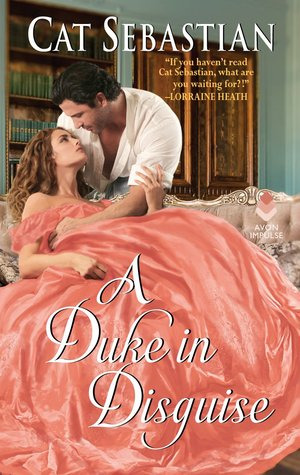
A Duke in Disguise. By Cat Sebastian. New York: Avon Books, 2019.
Rating: 3/5 stars
Genre: historical romance
Part of a Series? Yes, Regency Impostors #2
Summary: One reluctant heir
If anyone else had asked for his help publishing a naughty novel, Ash would have had the sense to say no. But he’s never been able to deny Verity Plum. Now he has his hands full illustrating a book and trying his damnedest not to fall in love with his best friend. The last thing he needs is to discover he’s a duke’s lost heir. Without a family or a proper education, he’s had to fight for his place in the world, and the idea of it—and Verity—being taken away from him chills him to the bone.
One radical bookseller
All Verity wants is to keep her brother out of prison, her business afloat, and her hands off Ash. Lately it seems she’s not getting anything she wants. She knows from bitter experience that she isn’t cut out for romance, but the more time she spends with Ash, the more she wonders if maybe she’s been wrong about herself.
One disaster waiting to happen
Ash has a month before his identity is exposed, and he plans to spend it with Verity. As they explore their long-buried passion, it becomes harder for Ash to face the music. Can Verity accept who Ash must become or will he turn away the only woman he’s ever loved?
***Full review under the cut.***
Content Warnings: sexual content, epileptic seizures, mentions of domestic violence and childhood neglect
I picked up this book because I was really excited about the premise. A bisexual female heroine? Who runs a print shop? That prints racy and borderline seditious books? And has a friends-to-lovers arc with the hero? Sounds like a dream!
While there were definitely some things that I loved, I definitely wish there was more work put into making the plot more angsty or high-stakes. Personally, I found the main conflict to be shallow, as the tension was not in the matter of the hero's hidden identity (which was resolved relatively quickly and without much drama), but in the protagonists' feelings and principles. That in itself isn't a bad thing, but in the case of this book, it seems like most of the conflict could have been resolved with a good sit-down-and-talk. I prefer my conflicts to be a little more external - such as social class being a barrier - so that the drama feels a bit more out of the protagonists' control. Thus, I can only give this book 3 stars. I liked it, I just wished there was *more*.
Writing: Sebastian's prose is pretty much what one might expect in a romance novel. It's straight-forward and doesn't involve a lot of rhetorical flourishes, which allows the plot to move along quickly and clearly. I don't have a lot to say other than that, and I don't mean it as an insult. The prose does its job, and I didn't have any trouble imagining what was going on.
Plot: It's perhaps misleading to say that this book is entirely about the hero's hidden identity. The matter of Ash's parentage and title doesn't start in earnest until some 130 pages into the novel, and before that, we mainly follow Verity as she tries to save her brother from being arrested. In my opinion, these two plots could have paralleled one another much better; Verity and her brother are radicals in that they support equal rights between the sexes and social classes, so I think the matter of Ash being a duke could have been a significantly more threatening strain on his relationship with the Plums. As it stands, it felt like Verity's brother was easily disposed of within the first 100 pages or so, and the matter of sedition and politics didn't play a major role in the plot involving Ash's parentage, making it feel like filler. I would have much rather seen more drama, such as Ash's new family not wanting him to associate with the Plums, having the Plums' politics threaten Ash's court case, etc. That way, Ash would have had to make more difficult choices regarding whether or not he wanted to claim his title.
Once we got into Ash's conflict, I do think Sebastian did some things well. I liked that Ash was accepting his place out of concern for his aunt's safety rather from any sense of familial duty or desire to be rich. The tension between blood vs found families was a good one, though I think more pressure could have been put on class issues.
I also think Sebastian could have crafted her overall narrative a little better, as I didn't exactly feel like the story was suspenseful or the scenes built on one another. Aside from brief moments, it felt like plot points were happening at random and I didn't really have a sense of where the story was going. I would have liked to see, for example, instances of Ash gathering evidence for his case or Verity's advice column mirroring what she was going through - something that gives us a clearer arc and entwines the printing/sedition storyline with the hidden identity/duke storyline (rather than seemingly have one happen after the other).
Characters: Verity, our heroine, is a bisexual woman who is afraid of showing weakness or asking for help. She runs her family's bookshop and prints a number of different things, from raunchy novels to a (weekly? monthly?) paper containing essays and advice. Aside from her bookishness, I liked that Verity was flawed; she was stubborn and stuck to her beliefs even when they caused conflict with the people around her, which felt real and multi-faceted. I also liked that she was direct when asking for what she wanted from Ash, and that she was committed to retaining her independence as a woman and printer. The one thing I didn't like about her was that, at times, she seemed to have a not-like-other-girls attitude. She would often turn her nose up at things women did that she considered frivolous or profess to not understand why people acted in certain ways (despite some of those actions being societal norms).
Ash, our hero, was also a refreshing character. Aside from being epileptic, he is very kind and caring, and he respects Verity's boundaries without being gruff and broody. I prefer these types of men in my romances because I like heroes who are emotional and vulnerable without being violent or abusive beforehand.
Supporting characters were hit or miss, but on the whole, most of them were complex and interesting. Nate, Verity's brother, is idealistic and stubborn, so he was a nice compliment to Verity's character. Portia, Verity's former lover, was perhaps my favorite; despite being Verity's ex, she was kind and supportive, putting their friendship over romantic feelings when it was clear that Verity needed someone to lean on. The rest felt more or less like archetypes (such as Ash's uncle) or characters used solely for plot reasons (Ash's aunt, Lady Caroline). Amelia, Portia's daughter, could have been interesting, but her plot line doesn't really enhance the main story.
Romance: Verity and Ash have a friends-to-lovers arc that, in my opinion, doesn't have enough drama or angst. This isn't to say I want more violence or petty conflict; rather, I would have liked to see the couple contend with external forces that put pressure on their relationship, such as social class. While class is certainly an issue, it doesn't seem like a great threat to the HEA ending, as everyone around Ash approves of the idea of marriage to Verity. As a result, the drama in this book was mainly driven by the characters' inability to talk about their feelings, and even when they do, the romance doesn't evolve or grow that much. There aren't really many milestones, such as them opening up about some past trauma (which I guess wouldn't be an issue, if they'd been best friends for so long) or navigating a crisis together (which they kind of do, but also don't). Everything is resolved when Verity and Ash just decide to get over their reasons for not being together, which to me felt cheap.
TL;DR: A Duke in Disguise provides some much needed queer and neurodivergent representation to the romance genre, but relies on a shallow plot without much angst or drama. While I did appreciate the focus on female independence throughout the novel, I also wish the characters had been made to contend with more external forces that threatened their relationship and that the romance had grown and evolved a little more.
3 notes
·
View notes
Text
Femininity in Game of Thrones - Sansa, Margaery and Daenerys (feat. Arya)
In Game of Thrones Sansa, Margaery and Daenerys represent a different ideas of femininity, and they operate within these ideas, how the stereotypes of their roles influence their behaviour and storyline, and how they affect each other.
[A Note: I talk a lot about the ‘ideal’ woman, or stereotypical feminine/masculine traits a lot. These don’t reflect my view, instead I tried to write this with Westerosi values in mind. Many of these points you might disagree with, that’s because they are valued by a fictional medieval society.]
Sansa represents the idea of Traditional Femininity - the ‘ideal’ woman, who is generally passive, beautiful and sweet, with an affinity for domestic duties.
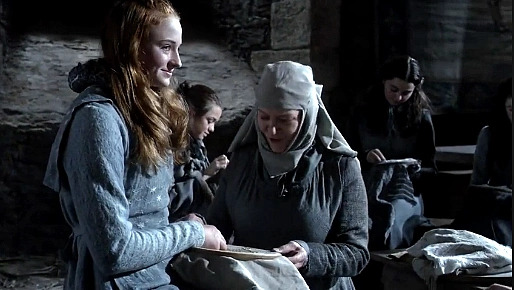
Sansa likes sewing and dancing, and plays the high harp, and dreams of gallant knights. Both Arya and Catelyn Stark recognise she is very much suited to the life of a noble lady.
“Sansa was a lady at three, always so courteous and eager to please. She loved nothing so well as tales of knightly valor.”
- Catelyn VII, A Clash of Kings
The qualities of Traditional Femininity are not always negative, but it cannot be ignored that it is this example that many women have been forced into or compared against in-world and in our own reality, and I’ll discuss this effect on Arya and Brienne later.
But Sansa is praised by many for her lady-like qualities, and because of this for a lot of her life she has lived in a privileged and sheltered life. This makes it difficult for her during her time in King’s Landing as she finds it difficult to understand and adapt to her life as a hostage, because she was taught to obey her lord, who was Joffrey.
Her passiveness shows within her storyline, as she never actively pursues a goal like Margaery or Daenerys. She is promised to Joffrey by her parents, her role in Joffrey’s death was unknown to her, and her escape from King’s Landing was in the hands of Dontos Hollard and Lord Baelish. She has two brief moments with Joffrey - one which she pleads for her father’s life, but this falls under ‘woman begs for a life to be saved’ and she relies on her sweet gentleness to sway Joffrey. The second is when she is brought to see the heads of her father and other members of the Stark household in King’s Landing.
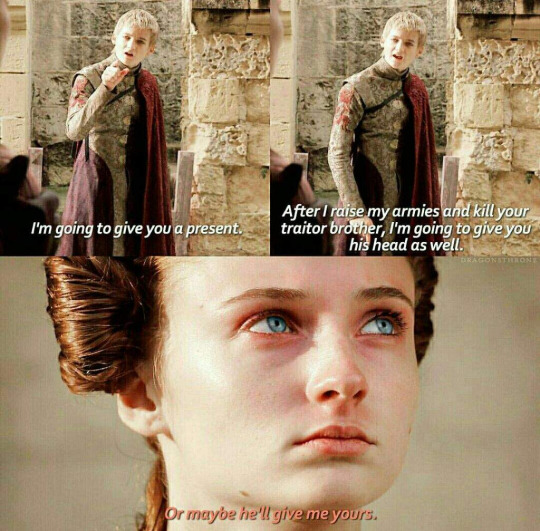
“Maybe my brother will give me your head.”
- Sansa VI, A Game of Thrones
Sansa shows that her passive gentle nature could evolve into a way that uses to advance herself. A way to use her power and influence to sway decisions and gain power by leaning into these qualities that she possesses and that people expect of her. An example of this could be Lady Macbeth, or on a more positive note, Margaery, who is up next. We actually see this again in more deliberate way, in the Vale. After Lysa’s death Sansa cries and absolves Petyr Baelish and herself of any guilt or responsibility. However, in Season 8, this is tried several more times, but ends up making her look catty and bitchy, because they did not lean into her strengths. In the end she is made Queen with the permission of brother, and we see no election creating her as Queen. As was at the start of the story, she returns to a passive role and lets others lift her up to new positions of power.

Margaery represents what could be considered the Femme Fatale - she has control and ambition, particularly regarding her own body. She is willing to push the boundaries of acceptable society, but she is also aware of the expectations of women, and leans into them, just as Sansa began to do. She plays innocent and passive while also manipulating the likes of Joffrey and Tommen with her body language.
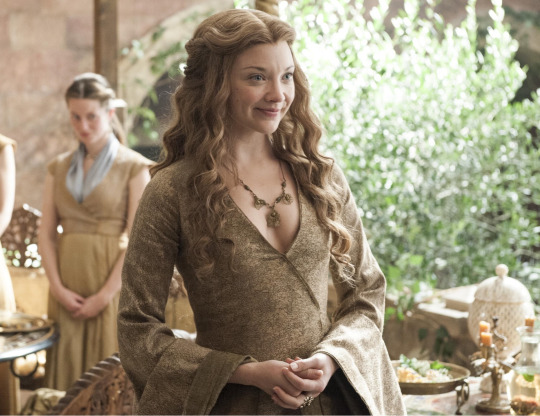
Margaery learnt from the likes of her grandmother the power thet women have without being physically aggressive. This is important for Margaery as a noble lady, because she has to conform to society's expectations in order to succeed. She plays innocent and passive, conforming to the ideals of society.
[If you’re really interested in how she manages to manipulate people I would really recommend watching this video from Charisma On Command, which explains how she is able to get Joffrey on her side as well as other characters.]
But Margaery is also willing to push against the restraints of this persona, baiting Cersei when she knows her own power will soon outstrip the others. She wears less modest clothing as opposed to the more reserved clothing of Cersei (highlighting her youth and beauty) and meets with the poor and orphans.
Like I mentioned before, Margaery uses her position and persuasion to influence decisions. She gets both Joffrey and Tommen alone and builds their trust of her, acting innocent and gentle for Joffery, making him feel dominant and powerful, and playful for Tommen, who, a younger boy was a little in awe of a beautiful woman. She submits to the High Sparrow, avoiding the Walk of Shame, and allowing her back into the Red Keep.
But this also leads to her downfall. Her constant pushing against Cersei and manipulation leads to Cersei correctly viewing her as an active threat. Cue the Sept of Baelor explosion. But does this mean that Margaery's ambition, manipulation and pushing against society's rules are a bad thing? Not at all. These actions allowed Margaery to pursue her goals on her own terms. It was Cersei's actions that put her in a position where she was stuck - and even then I have seen many criticisms of the whole Sept of Baelor, so this can maybe be put down to D&D wanting a quick way to kill her off.
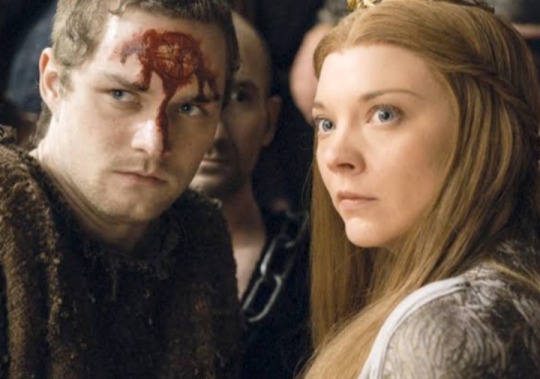
Daenerys represents the Masculine Femininity - a combination of typical masculine and feminine traits. Daenerys dresses in typically feminine clothes - long dresses with intricate embroidery, and she has long braided hair. She does not make her more masculine, and falls into the bracket with Margaery and Sansa, as they are all very feminine characters. The difference between them and Daenerys, is that Dany has many more traits typically attributed to men - she is willing to take an aggressive approach herself, usually involving her dragons. She is also much more direct in her threats -
“We will lay waste to armies, and burn cities to the ground. Turn us away and we will burn you first.”

This is unlike the other two feminine women, Margaery and Sansa, who are not so aggressive, but this does not make this a bad thing. Daenerys benefits from her drive and ambition, and her direct attitude allows her to be taken more seriously when dealing with the slave masters in Essos.
Daenerys does not uphold a persona, and lays out her cards on the table. People see her genuinely, and her compassion and sense of justice gains her friends as well as enemies. This clash of stereotypical male and female traits e.g. compassion vs. strict justice, gentleness vs. aggressiveness, creates her character, and often draws criticism from other characters. Like Sansa was considered foolish, Margaery provocative, Daenerys is persuaded to be more gentle and forgiving, which she ignores. She is told be less gentle and compassionate, when wanting to free the slaves of Yunkai, but ignores that as well. Just like Sansa and Margaery ,who began to learn to take other’s expectations as an advantage, Daenerys embraces both sides of her nature, understanding when to be merciful and when to be stern - Like a mother!
Considering that characters like Jon Snow are never criticised on screen for executing Janos Slynt, or Tyrion Lannister using wildfire on Stannis’ army, the fact that Daenerys faces negativity whenever she suggests aggressive action, such as executing one of her advisors after he killed an imprisoned Son of the Harpy, or flying to the Red Keep to confront Cersei (in Season 7, she never actually says she will burn it down), it could be concluded that Daenerys as a woman, is being unfairly leashed, while her male counterparts dole out dubious acts of justice without someone in the back saying “maybe instead, you could be nice to them!”
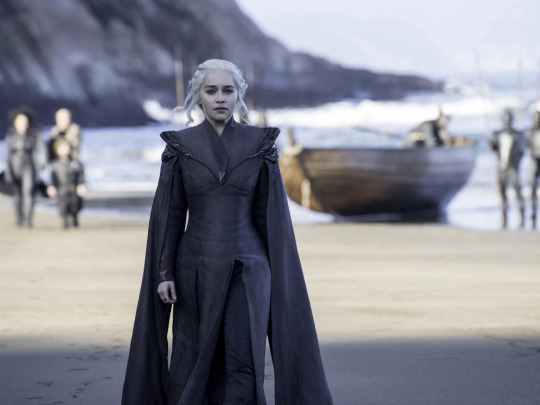
Arya is probably one of the most central non-feminine characters in Game of Thrones. She rejects the traditional ideals of the gender - Arya rejects the expectations placed upon her as a woman, and the restraints that come with it.
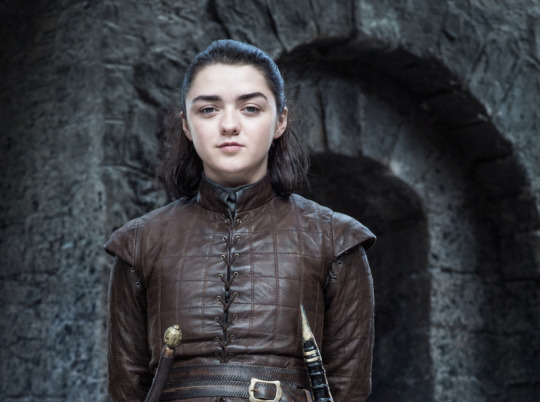
Arya in the show is a cold blooded killer, especially in the later seasons. She calmly slices a man’s throat, and bakes his sons into a pie. Arya in the books however is compassionate, protective, and is much more inclined to typically feminine things than in the show. In the show, Arya does show love and kindness, but to a lesser degree than in the books (which I think is a damn shame).
Arya and Daenerys are characters who receive a lot of hatred and criticism. It could be called coincidence, but both the characters fall into categories OUTSIDE the ‘ideal woman’. Sansa and Margaery are compassionate and gentle and are (or believed to be) passive. Daenerys and Arya are also compassionate (depending on the media for Arya) and protective, but unlike Sansa and Margaery, they do not appear as passive to onlookers. They are direct and often aggressive in their approach to things, but also practice restraint and impulsivity in situations.
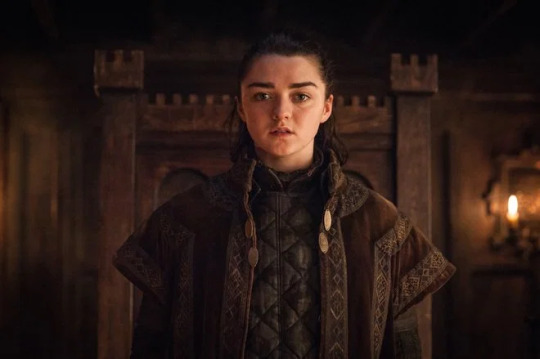
Arya is most definitely disliked for the fact that she, a woman, dresses and carries out actions unlike what she is supposed to do. Sansa fed Ramsey to the dogs, and rightfully so, because he raped and abused her. Arya kills Meryn Trant and Walder Frey in brutal ways, but I have seen a lot of hate towards her that is generally not directed at Sansa. Perhaps it could pinned to the fact that Sansa herself did not directly kill Ramsey, and walked away as he died. Arya killed them herself, and watched as they died.
Both women clearly took pleasure in the killing, so I think it would not be wrong that many people see Sansa’s action as triumphant, her smile a small crack in her ladylike demeanor, and then turn around and condemn Arya for doing the same, because she is less ladylike and more masculine. Sansa does not engage in the dirty work, Arya does. Sansa is a gentle lady exacting justice upon a cruel man, but looks away from the gore. Arya is a psychopath who gladly takes a hand in brutal murder.
These situations are essentially the same, yet Arya is shamed and insulted by the audience for it. It is similar to Daenerys. Every harsh action - the execution of Mirri Maz Duur, Doreah and Xaro Xhoan Daxos, the slave masters, the Tarlys. All of them are analyzed and judged and she is hated for it. She is physically powerful (I say this because of her dragons) and ambitious, and like Arya, often has a hand in the execution of her enemies.
Daenerys does not take pleasure in most of these scenarios, mainly because unlike Arya, the executions are usually not revenge motivated. Yet again, she is villified, almost for the opposite reason to Arya. She dresses feminine yet acts in ways often interpreted as masculine. Many might argue that this is not the sole reason for the hatred directed towards, and I agree, but I definitely think that it plays a strong part, especially as other male characters, and Sansa do not have essays painting them as villains and specifically using the executions they carry out.
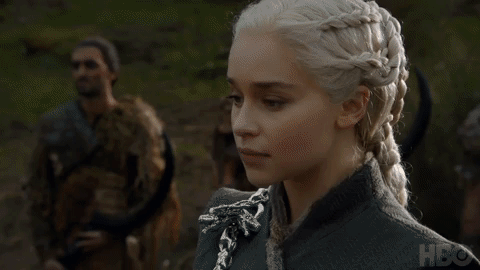
I also want to address the claim that many Sansa stans have, which is the reason I felt prompted to make this in the first place. Many of Sansa’s fans feel that she is hated because she is feminine, unlike other characters, which I felt is wrong, and I think I’ve provided enough evidence for that. It cannot be denied that the specific type of femininity that Sansa exhibits has been used against women in her own universe and ours. If you are not modest, you’re a slut, women should be quiet and gentle, they should be homemakers. These ideas are old but they still are quite common in many aspects of society today, which is also why I made this post, because it seems that this could one of the reasons that Arya and Dany are disliked so much. I also wanted to show that Margaery, while different, definitely fits into Sansa’s femininity, and I see hardly any hate posts about her.
So, to conclude, Sansa, the Traditional Femininity earned her praise and allowed her to rise up the ranks, but also left her passive and naive, when she was younger, because of the shelter her privilege gave her (the privilege I refer to is the respect and admiration of her friends and older women in her life, something Arya did not have due to her lack of talent/interest in feminine duties). Margaery used Traditional Femininity as a cover which allowed her to orchestrate her own ambition and desires, while subtly manipulating those around her. Daenerys used strength to intimidate her enemies and generosity to gain her friends, but these qualities drew a lot of criticism to her character. Arya is similar - she faces criticism for not being ‘a real woman’ (which I have seen people say). None of these characters are at fault for how they are written and the consequences that result from their characterisation, but it is us, as an audience, to recognise these differences between characters especially in regard to how we view women, and how they influence our view of the characters.
35 notes
·
View notes